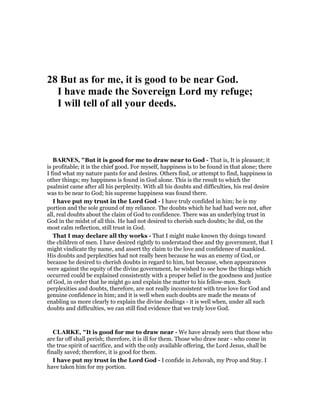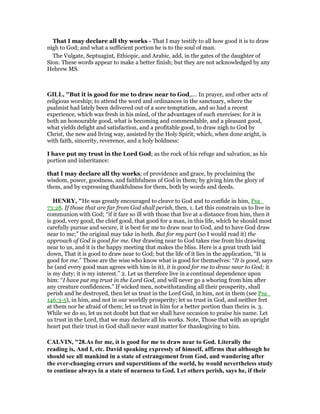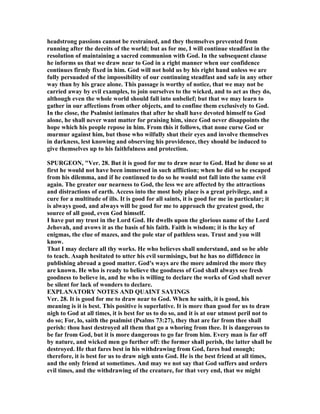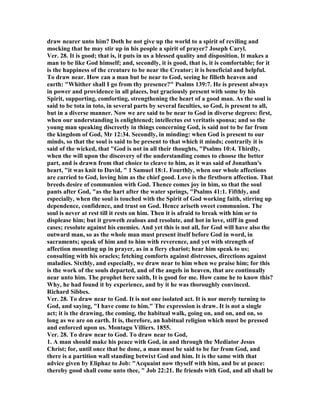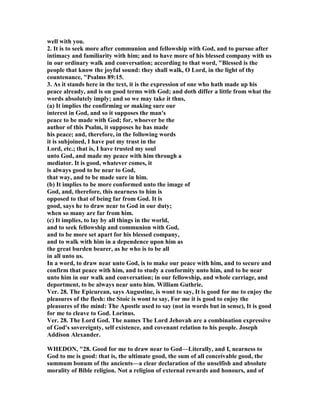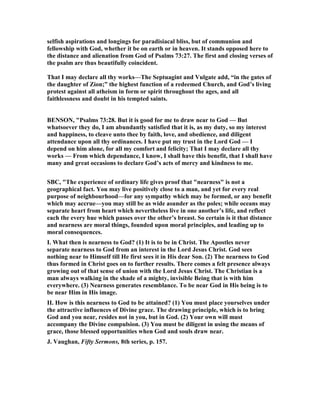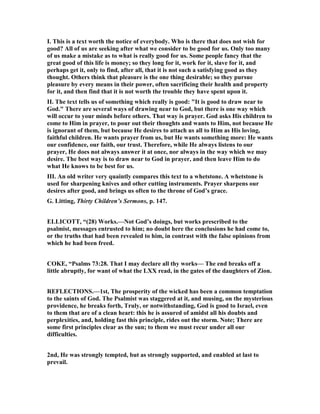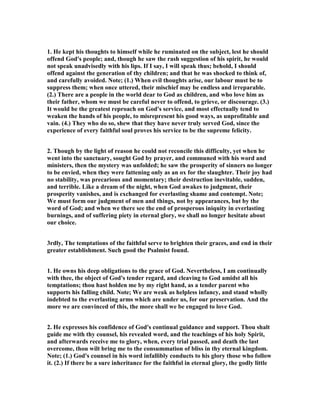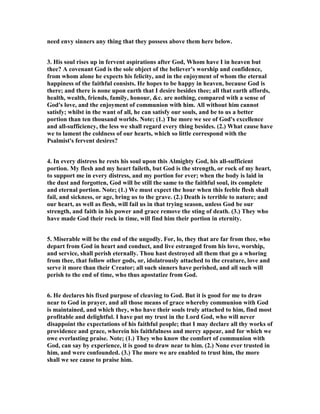This document provides commentary on Psalm 73 from multiple scholars and theologians. It includes:
1) A brief introduction providing context that Psalm 73 deals with the problem of the prosperity of the wicked and suffering of the righteous.
2) Extensive quotes and summaries from various scholars and theologians analyzing themes, divisions, and meanings in the psalm. They discuss topics like the temptation described, the fate of the ungodly, and gaining understanding by entering God's sanctuary.
3) Discussion of the authorship and themes of the psalm, including the temptation to doubt God's providence when seeing injustice in the world, but finding reassurance through faith.
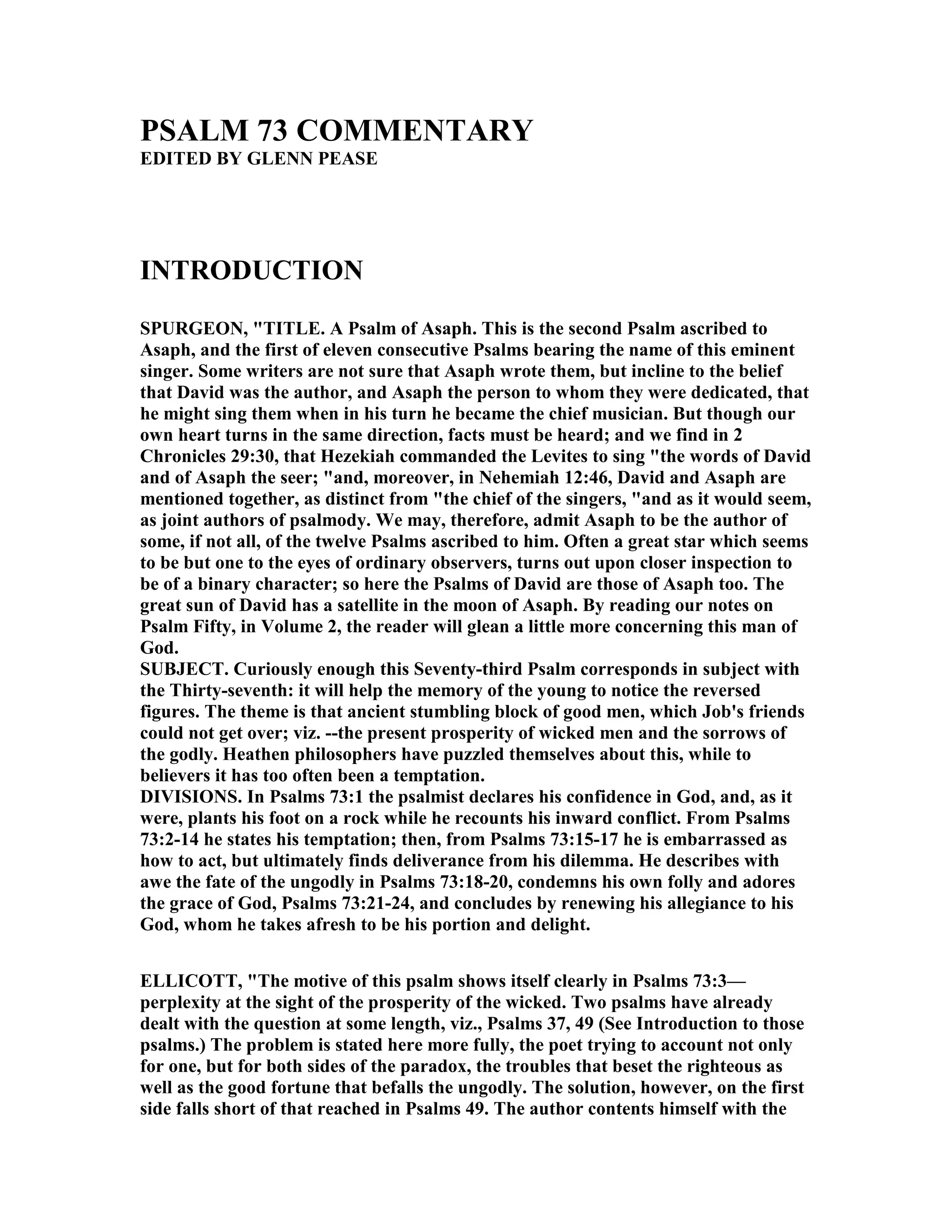
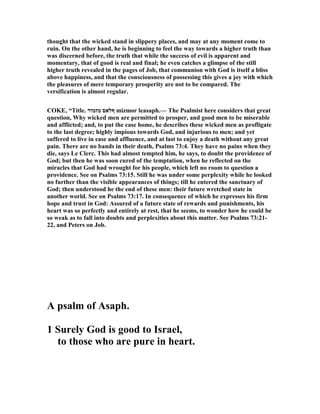
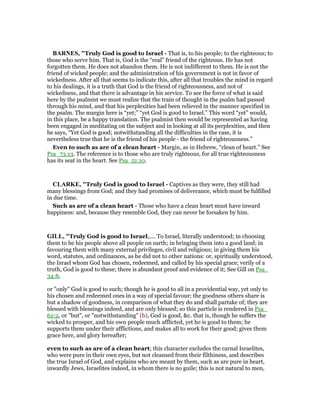
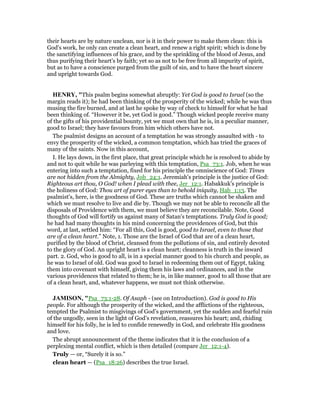
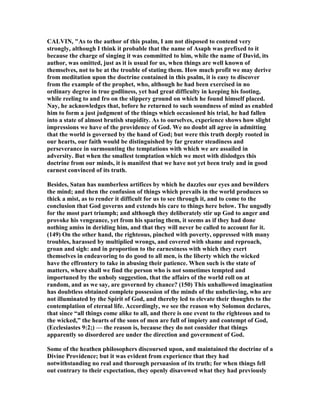
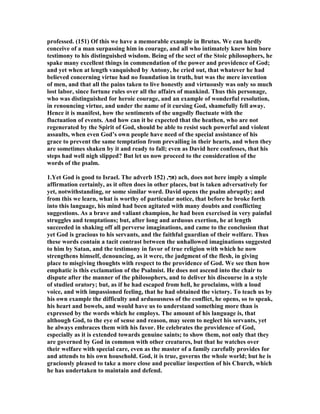
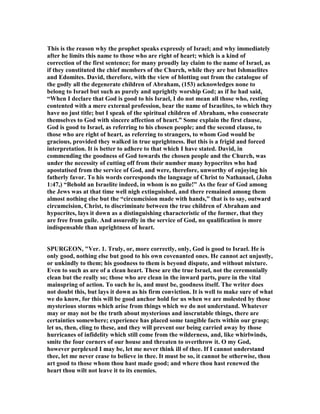
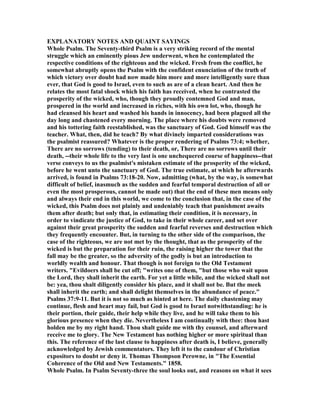
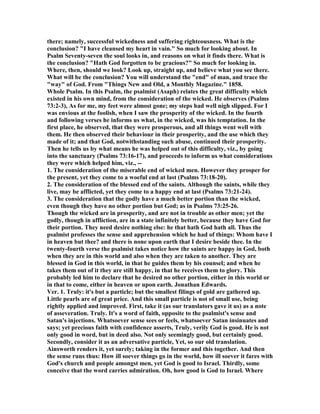
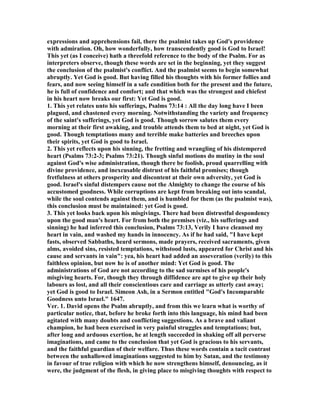
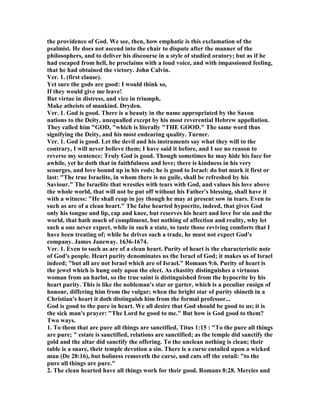
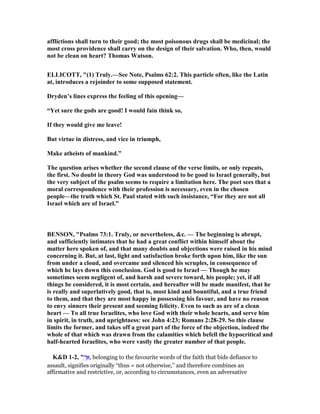
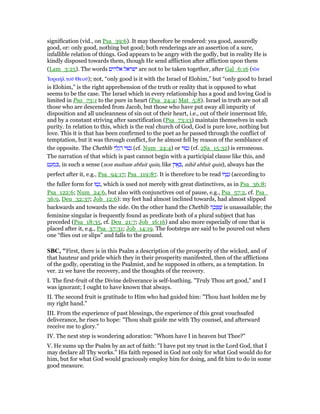
![J. Duncan, The Pulpit and Communion Table, p. 236.
WHEDON, "1. Truly God is good to Israel—The psalmist has now passed through his
temptation, and, being reassured, can “set to his seal [set his seal to it] that God is true.”
John 3:33. The “truly,” certainly, here, is his amen or verily to the divine dealings, which
now he perceives are “good,” not only in the sense of benevolence, but of moral fitness.
This had been the point of his wavering. “Good to Israel,” here, indicates that he is not
speaking on his own behalf merely, as reciting only a personal experience, but as the
spokesman of the nation. It was God’s dealing with the nation that had stumbled him,
which now he acknowledges “good.” The Hebrew word here rendered “good” is a broad
term, and signifies the quality of perfect moral excellence.
A clean heart—The pure of heart. Such was Israel by profession, and the really pure
should receive the promise.
This Psalm is the work of a believer, and yet it is the expression of a soul who has passed
through doubt and experienced all its bitterness.
I. Consider what made Asaph doubt. Asaph had seen the course of this world: he had
seen the prosperity of the wicked; he had seen those who feared God suffering in
desertion and in despair. His soul was troubled; and in a gloomy hour he called in
question the righteousness, the wisdom, and also the action of God. The spectacle of this
world is a great school for unbelief, a school which makes more impious people than all
the books of atheists. If we contemplate the world, our gaze wavers, for we seek in vain
there for that law of love and of righteousness which, it seems to us, God should have
marked on all His works. As children, we believed we should find it there, for a science
had been made for our use. History for us was a drama of which God was the living
Hero: if the righteous suffered, it was a transitory trial and soon to be explained; if the
wicked triumphed, it was the dazzling flash of a day. Later on our view was enlarged, and
God had receded from us. Between Him and us was raised the immense, inexorable wall
of fatality. (1) Fatality in nature, for its smile is deceptive; and when we have seen it
shine on a grave in presence of which our heart is torn, it appears to us implacable even
in its very beauty. We study it, and everywhere we find a savage law in it, the law of
destruction, which pursues its silent work each day and each minute. (2) Fatality in
history. Progress? Where is it in the old world? What plan is there in the history of those
races who are sinking today, dragged down by an incurable barbarism, in those lucky
strokes of force, in those startling immoralities, which success strengthens and
sanctions? Is it consoling to tell us that the blood of the righteous is a fruitful seed? Over
how many countries has it not flowed, leaving only the barrenness of the desert! (3)
Fatality in life. Even here the moral law wavers and is often effaced. There is no need to
be a philosopher in order to encounter the problems of life; trial, sooner or later, places
them before us. For some it is the trial of poverty, for others the trial of ailment; but
what excites excessively all these doubts is injustice.
II. For a moment Asaph’s conscience wavered; for a moment giddiness seized him. How
is it that he did not fall into the abyss? Asaph believed in God. He could not believe in
chance, for in his people’s language there is not even a word to designate chance. Asaph](https://image.slidesharecdn.com/psalm73commentary-160603141317/85/Psalm-73-commentary-14-320.jpg)
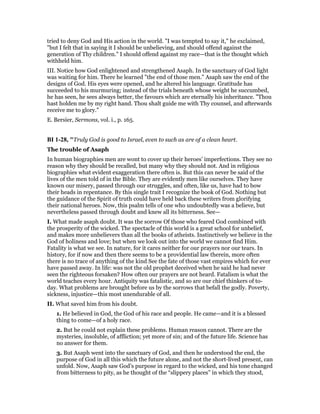
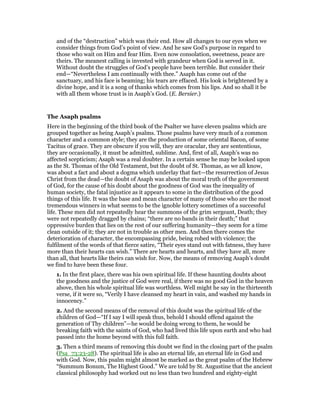
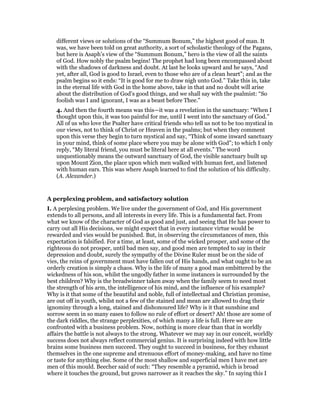
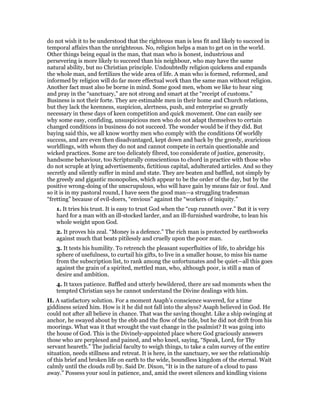
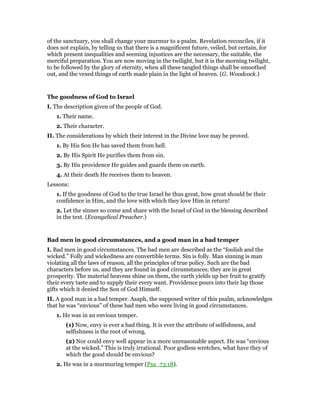
![(1) A right act. Cleansing the heart and washing the hands means the cultivation
of personal holiness; and this is certainly a right work for man. It implies—
(1) The consciousness of personal defilement.
(2) The possession of a cleansing element.
(3) The effort of personal application. Moral evil is the defilement; Christianity is
the cleansing element; and practical faith is the personal application.
3. A wrong opinion. The writer thought that it was “in vain.” Three facts show that
this is a great mistake:
(1) That moral holiness involves its own reward.
(2) That moral holiness is promoted by temporal adversity.
(3) That moral holiness will meet with its perfect recompense hereafter.
No; this cleansing the heart is no vain work. No engagement is so real and profitable.
Every fresh practical idea of God is a rising in the scale of being and of bliss; every
conquest over sense, appetite, and sin, is a widening and strengthening of our spiritual
sovereignty; every devout sentiment, earnest resolve, and generous sacrifice attunes our
hearts to higher music. (Homilist.)
COFFMA , “I TRODUCTIO FOR BOOK III
Psalms 73-89 are entitled Book III. These Psalms are classified as "The Asaph
Group," composed of Psalms 73-83, the only other Asaph Psalm being Psalms 50 in
Book II. "All of this group are Elohimic."[1] Most of the remaining Psalms in Book
IV are ascribed to the Sons of Korah. "Some of these are Elohimic and some are
Jehovist."[2] Three Psalms in this Book are ascribed, one each, to David, Heman
and Ethan.
"The Psalms of Asaph are of different dates, but are similar in character and have
many features in common ... They are national and historical ... They have a definite
doctrine of God, who is presented as "The Shepherd of Israel" (Psalms 80:1), and
the people are the sheep of his pasture (Psalms 74:1; 77:20; 79:13) ... History is used
for instruction, admonition and encouragement."[3]
Dr. DeHoff summarized this entire book as follows: Psalms 73 handles the problem
of the wicked's prosperity; Psalms 74 discusses the national disaster in Jerusalem's
destruction; Psalms 75 speaks of the final judgment; Psalms 76 gives thanks for a
great victory; Psalms 77-78 are historical extolling God's marvelous works; Psalms
79-80 give us a glance of a great disaster; Psalms 81-82 deplore the sinfulness of
God's people; Psalms 83 is a prayer for protection; Psalms 84 stresses the
blessedness of those `in God's house.' (with an application to Christ's church);
Psalms 85-86 contain prayers of thanksgiving to God and pleas for mercy and
forgiveness; Psalms 88 is the prayer of a shut-in suffering from a long illness; and](https://image.slidesharecdn.com/psalm73commentary-160603141317/85/Psalm-73-commentary-20-320.jpg)
![Psalms 89 is a magnificent presentation of the Throne of David which will endure
forever.[4]
This is the shortest of the Five Books of Psalms.
"Each of the major Psalm-types is represented in Book IV, except Penitential."[5]
We shall also observe that there are many quotations in the ew Testament from
this portion of the Psalms. This is especially true of Psalms 89 which is referred to in
Acts 13:22, (Psalms 73:20); 2 Thessalonians 1:10 (Psalms 73:7); Revelation 1:5
(Psalms 73:27,37). Other quotations are Malachi 13:35 (Psalms 78:2), John 6:31
(Psalms 78:24), and John 10:34 (Psalms 82:6).
PSALM 73
THE PROBLEM OF THE PROSPERITY OF THE WICKED
Where is the Christian who has not struggled with this same problem? Righteous
people seem pressed down on every hand, often struggling for the very necessities of
life, whereas openly arrogant and wicked unbelievers flaunt their godless lives,
sometimes wallowing in wealth and luxuries. This psalm addresses that very
problem.
Of course, there is one practical reason for the seeming disparity between what
appears to be God's treatment of the righteous and the wicked, and that is the truth
emphasized by Jesus who stated that, "The sons of this world are for their own
generation wiser than the sons of the light" (Luke 16:8). There surely seems to be a
naivete among God's people that often hinders their worldly success. This is not the
only Old Testament Scripture that deals with this problem. Psalms 37 and Psalms
49, as well as the Book of Job likewise confront this problem, dealing with it
extensively. We have already commented extensively on this problem in Psalms 37
and Psalms 49.
For word on Asaph, see under Psalms 50 in Vol. I of this Series. Asaph (or possibly
his sons) authored Psalms 73-83.
In this psalm, the conclusion is announced at the beginning.](https://image.slidesharecdn.com/psalm73commentary-160603141317/85/Psalm-73-commentary-21-320.jpg)
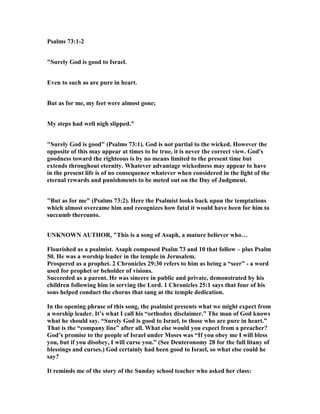
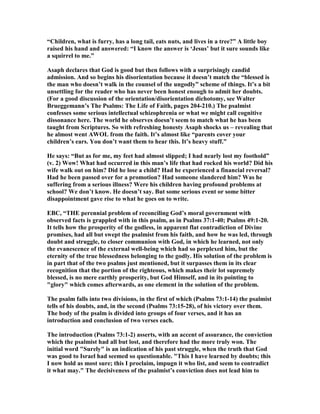
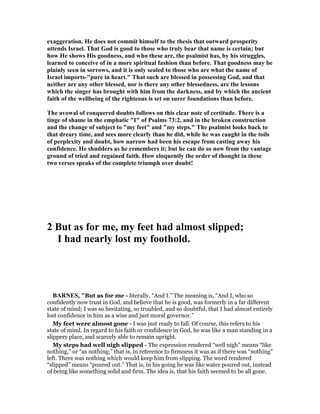
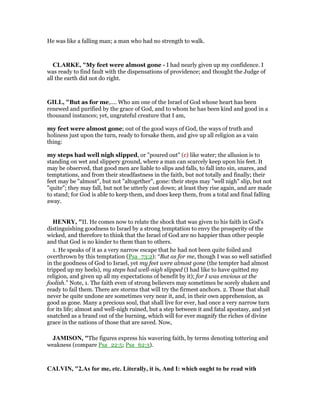
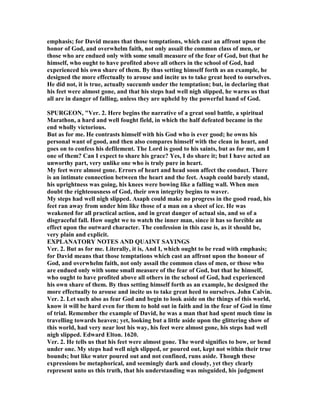
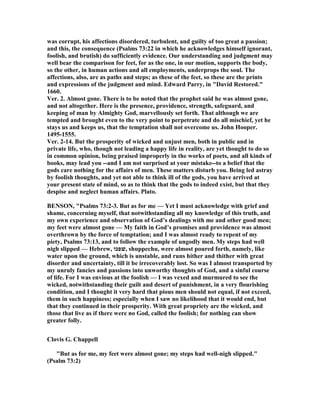
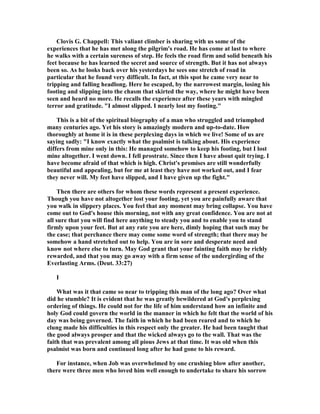
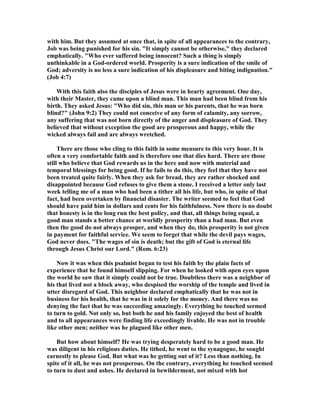
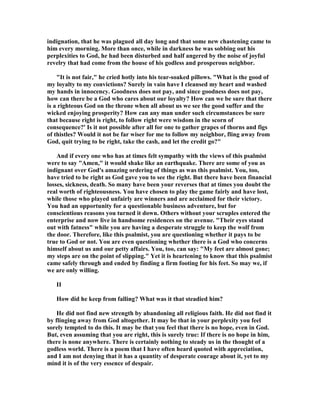
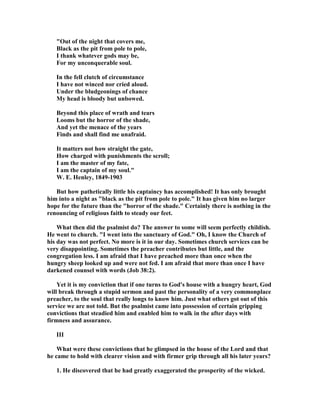
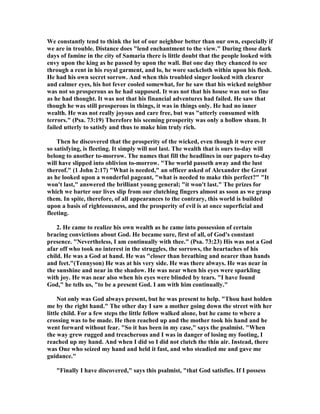
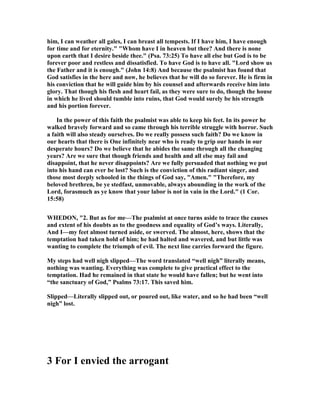
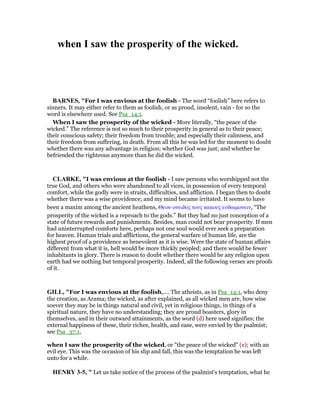
![was tempted with and tempted to.
(1.) He observed that foolish wicked people have sometimes a very great share of
outward prosperity. He saw, with grief, the prosperity of the wicked, Psa_73:3. Wicked
people are really foolish people, and act against reason and their true interest, and yet
every stander-by sees their prosperity. [1.] They seem to have the least share of the
troubles and calamities of this life (Psa_73:5): They are not in the troubles of other men,
even of wise and good men, neither are they plagued like other men, but seem as if by
some special privilege they were exempted from the common lot of sorrows. If they meet
with some little trouble, it is nothing to what others endure that are less sinners and yet
greater sufferers.
JAMISO 3-9, "The prosperous wicked are insolently proud (compare Psa_5:5).
They die, as well as live, free from perplexities: pride adorns them, and violence is their
clothing; indeed they are inflated with unexpected success. With all this -
CALVI , "Verse 3
3.For I envied the foolish (154) Here he declares the nature of the temptation with
which he was assailed. It consisted in this, that when he saw the present prosperous
state of the wicked, and from it judged them to be happy, he had envied their
condition. We are certainly under a grievous and a dangerous temptation, when we
not only, in our own minds, quarrel with God for not setting matters in due order,
but also when we give ourselves loose reins, boldly to commit iniquity, because it
seems to us that we may commit it, and yet escape with impunity. The sneering jest
of Dionysius the younger, a tyrant of Sicily, when, after having robbed the temple of
Syracuse, he had a prosperous voyage with the plunder, is well known. (155) “See
you not,” says he to those who were with him, “how the gods favor the
sacrilegious?” In the same way, the prosperity of the wicked is taken as an
encouragement to commit sin; for we are ready to imagine, that, since God grants
them so much of the good things of this life, they are the objects of his approbation
and favor. We see how their prosperous condition wounded David to the heart,
leading him almost to think that there was nothing better for him than to join
himself to their company, and to follow their course of life. (156) By applying to the
ungodly the appellation of foolish, he does not simply mean that the sins which they
commit are committed through ignorance or inadvertence, but he sets their folly in
opposition to the fear of God, which is the principal constituent of true wisdom.
(157) The ungodly are, no doubt, crafty; but, being destitute of the fundamental
principle of all right judgment, which consists in this, that we must regulate and
frame our lives according to the will of God, they are foolish; and this is the effect of
their own blindness.
SPURGEO , "Ver. 3. For I was envious at the foolish. "The foolish" is the generic
title of all the wicked: they are beyond all others fools, and he must be a fool who
envies fools. Some read it, "the proud:" and, indeed, these, by their ostentation,
invite envy, and many a mind which is out of gear spiritually, becomes infected with
that wasting disease. It is a pitiful thing that an heir of heaven should have to](https://image.slidesharecdn.com/psalm73commentary-160603141317/85/Psalm-73-commentary-35-320.jpg)
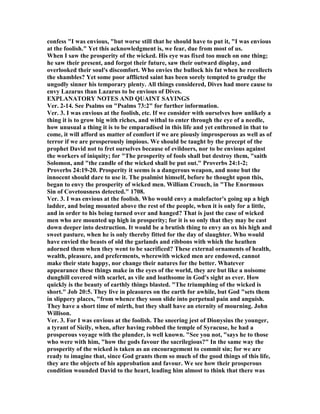
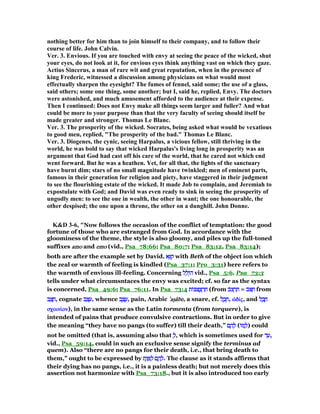
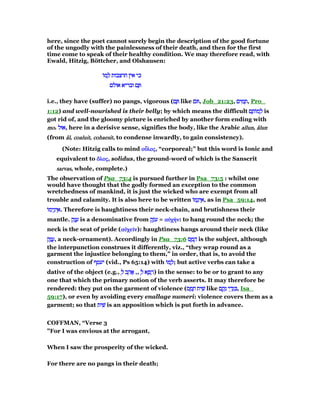
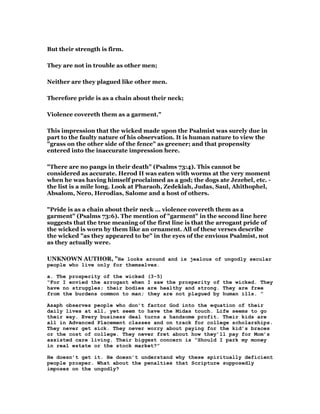
![In one particular "Calvin & Hobbes" cartoon, Calvin is playing on the
playground swing. The school bully approaches and orders him to "Get off
the swing, Twinky." Calvin stands his ground. "Forget it, Moe. Wait your
turn." The second frame is just the big punch - shoes and stars and
swing all over the place. The final frame finds Calvin in a beat-up
heap, uttering his perspective, "It's hard to be religious when certain
people are never incinerated by bolts of lightning."
Asaph is simply expressing what you and I feel sometimes - that it's
tough to believe when prejudice, injustice, affliction and temptation
pound relentlessly at your door. He doesn’t understand the prosperity of
hardened sinners. He looks around and sees…
4 They have no struggles;
their bodies are healthy and strong.[a]
BAR ES, "For there are no bands in their death - The word rendered “bands”
here means properly “cords tightly drawn,” Isa_58:6; then, pains, pangs, torments - “as
if” one were twisted or tortured with pain, as a cord is closely twisted. The word occurs
only in Isa_58:6, and in this place. The fact which is here referred to by the psalmist,
and which gave him so much uneasiness, was that which so often occurs, that when the
wicked die, they do not seem to suffer in proportion to their wickedness; or there seem
to be no special marks of the divine displeasure as they are about to leave the world.
They have lived in prosperity, and they die in peace. There is no uncommon agony in
death; there is no special alarm about the future world. They have enjoyed this world,
and a sinful life seems now to be followed by a peaceful death. They do not even suffer as
much in death as good people often do; - what then is the advantage of piety? And how
can we believe that God is just; or that he is the friend of the righteous; or even that
there is a God? Of the fact here adverted to by the psalmist, that the wicked do thus live
and die, there can be no doubt, and that fact has given perplexity to good people in all
ages of the world.
But their strength is firm - Margin, as in Hebrew, “fat.” That is, They are not
emaciated and weakened by disease, but they go down to death apparently from good
health, and without wasting disease. See the notes at Job_21:23-26.
CLARKE, "No bands in their death - Many of the godly have sore conflicts at
their death. Their enemy then thrusts sore at them that they may fall; or that their](https://image.slidesharecdn.com/psalm73commentary-160603141317/85/Psalm-73-commentary-40-320.jpg)
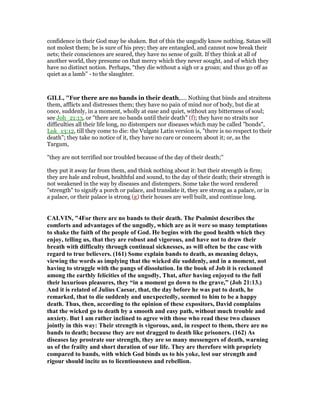
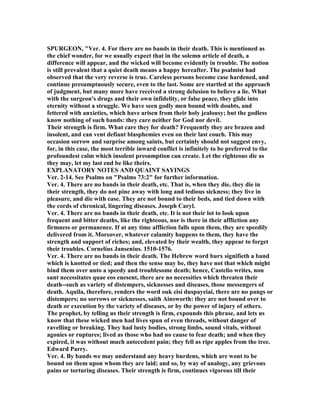
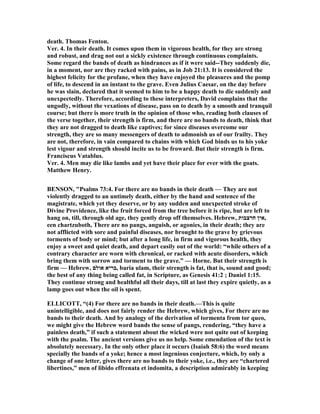
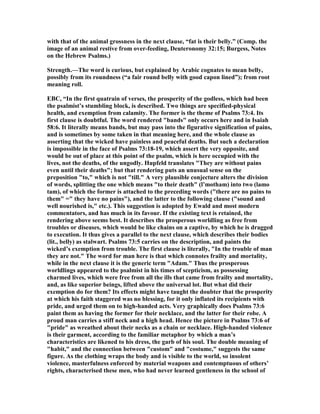
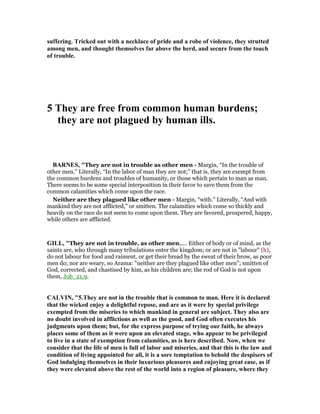
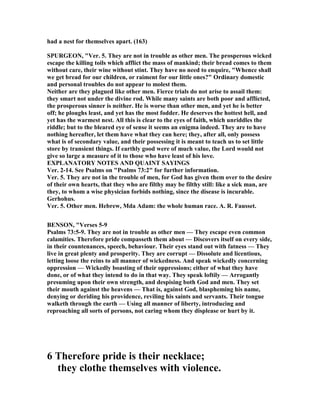
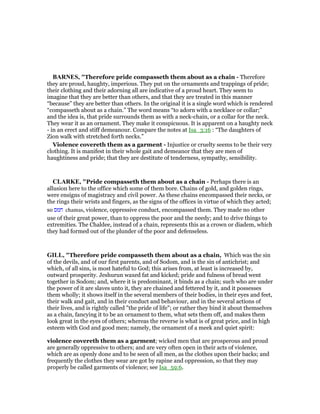
![HE RY 6-12, "He observed that they made a very bad use of their outward
prosperity and were hardened by it in their wickedness, which very much strengthened
the temptation he was in to fret at it. If it had done them any good, if it had made them
less provoking to God or less oppressive to man, it would never have vexed him; but it
had quite a contrary effect upon them. [1.] It made them very proud and haughty.
Because they live at ease, pride compasses them as a chain, Psa_73:6. They show
themselves (to all that see them) to be puffed up with their prosperity, as men show their
ornaments. The pride of Israel testifies to his face, Hos_5:5; Isa_3:9. Pride ties on their
chain, or necklace; so Dr. Hammond reads it. It is no harm to wear a chain or necklace;
but when pride ties it on, when it is worn to gratify a vain mind, it ceases to be an
ornament. It is not so much what the dress or apparel is (though we have rules for that,
1Ti_2:9) as what principle ties it on and with what spirit it is worn. And, as the pride of
sinners appears in their dress, so it does in their talk: They speak loftily (Psa_73:8); they
affect great swelling words of vanity (2Pe_2:18), bragging of themselves and disdaining
all about them. Out of the abundance of the pride that is in their heart they speak big.
[1.] It made them oppressive to their poor neighbours (Psa_73:6): Violence covers them
as a garment. What they have got by fraud and oppression they keep and increase by the
same wicked methods, and care not what injury they do to others, nor what violence they
use, so they may but enrich and aggrandize themselves. They are corrupt, like the
giants, the sinners of the old world, when the earth was filled with violence, Gen_6:11,
Gen_6:13. They care not what mischief they do, either for mischief-sake or for their own
advantage-sake. They speak wickedly concerning oppression; they oppress, and justify
themselves in it. Those that speak well of sin speak wickedly of it. They are corrupt, that
is, dissolved in pleasures and every thing that is luxurious (so some), and then they
deride and speak maliciously; they care not whom they wound with the poisoned darts
of calumny; from on high they speak oppression. [3.] It made them very insolent in their
demeanour towards both God and man (Psa_73:9): They set their mouth against the
heavens, putting contempt upon God himself and his honour, bidding defiance to him
and his power and justice. They cannot reach the heavens with their hands, to shake
God's throne, else they would; but they show their ill-will by setting their mouth against
the heavens. Their tongue also walks through the earth, and they take liberty to abuse
all that come in their way. No man's greatness or goodness can secure him from the
scourge of the virulent tongue. They take a pride and pleasure in bantering all mankind;
they are pests of the country, for they neither fear God nor regard man. [4.] In all this
they were very atheistical and profane. They could not have been thus wicked if they had
not learned to say (Psa_73:11), How doth God know? And is there knowledge in the
Most High? So far were they from desiring the knowledge of God, who gave them all the
good things they had and would have taught them to use them well, that they were not
willing to believe God had any knowledge of them, that he took any notice of their
wickedness or would ever call them to an account. As if, because he is Most High, he
could not or would not see them, Job_22:12, Job_22:13. Whereas because he is Most
High therefore he can, and will, take cognizance of all the children of men and of all they
do, or say, or think. What an affront is it to the God of infinite knowledge, from whom all
knowledge is, to ask, Is there knowledge in him? Well may he say (Psa_73:12), Behold,
these are the ungodly.
CALVI , "6.Therefore pride compasseth them as a chain. This complaint proceeds
farther than the preceding; for we are here told that although God sees the ungodly](https://image.slidesharecdn.com/psalm73commentary-160603141317/85/Psalm-73-commentary-48-320.jpg)
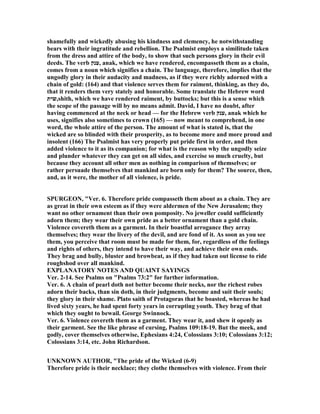
![callous hearts comes iniquity; the evil conceits of their minds know no limits. They
scoff, and speak with malice; in their arrogance they threaten oppression.
Asaph sees that they are show-offs, braggarts, egotist - aggressive, and arrogant.
They are condescending bullies who let nothing stand in their way when they want
something. And they usually get what they want. They are the polar opposite of
what the Scriptures promote in terms of a godly lifestyle. He sees them puffed up
with pride and thinks “Doesn’t the Bible say ‘Pride goes before destruction and a
haughty spirit before a fall’ (Proverbs 16:18)? Then how do they get away with it?”
Speaking to a group of broadcasters, Ted Turner described who God really was:
"Delegates to the United ations are not as important as the people in this room.
We're the ones that determine what the people's attitudes are. It's in our hands." --
Cornerstone Magazine, Vol. l8, o. 90
These proud sinners even talk religion. “Their mouths lay claim to heaven, and their
tongues take possession of the earth” (v. 9). They want to have their cake and eat it
too. They assume they are destined for eternal glory. Preoccupied with pride, power,
prestige and possessions here on earth, they even presume that heaven is theirs as
well. How much better can it get for these guys?
WHEDO , "6. Pride compasseth them… as a chain—Pride has stretched out their
neck, or, has necklaced them. The neck is here alluded to and regarded as the seat of
expression to pride, by which it is carried loftily and with rich ornamentation. See
Psalms 75:5; Isaiah 3:6; Proverbs 1:9; Song of Solomon 4:9. Thrupp, who considers
this psalm to belong to the occasion of Sennacherib’s invasion, thinks he sees here
an allusion to the ornamental necklaces of the Assyrians, as described in Bonomi’s
“ ineveh.” So also of the luxurious attire, colouring of eyelids, etc., in the following
verses.
As a garment—A robe, covering the entire person. See Psalms 109:18
7 From their callous hearts comes iniquity[b];
their evil imaginations have no limits.
BAR ES, "Their eyes stand out with fatness - As the fruit of their high living.](https://image.slidesharecdn.com/psalm73commentary-160603141317/85/Psalm-73-commentary-50-320.jpg)
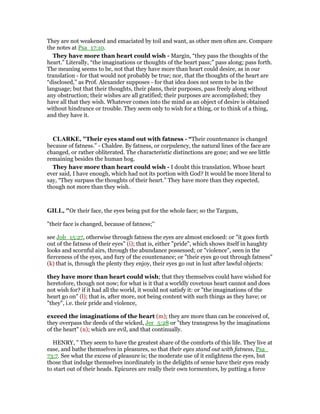
![upon nature, while they pretend to gratify it. And well may those feed themselves to the
full who have more than heart could wish, more than they themselves ever thought of or
expected to be masters of. They have, at least, more than a humble, quiet, contented
heart could wish, yet not so much as they themselves wish for. There are many who have
a great deal of this life in their hands, but nothing of the other life in their hearts. They
are ungodly, live without the fear and worship of God, and yet they prosper and get on in
the world, and not only are rich, but increase in riches, Psa_73:12. They are looked upon
as thriving men; while others have much ado to keep what they have, they are still
adding more, more honour, power, pleasure, by increasing in riches. They are the
prosperous of the age, so some read it. [3.] Their end seems to be peace. This is
mentioned first, as the most strange of all, for peace in death was every thought to be the
peculiar privilege of the godly (Psa_37:37), yet, to outward appearance, it is often the lot
of the ungodly (Psa_73:4): There are no bands in their death. They are not taken off by a
violent death; they are foolish, and yet die not as fools die; for their hands are not bound
nor their feet put into fetters, 2Sa_3:33, 2Sa_3:34. They are not taken off by an untimely
death, like the fruit forced from the tree before it is ripe, but are left to hang on, till,
through old age, they gently drop of themselves. They do not die of sore and painful
diseases: There are no pangs, no agonies, in their death, but their strength is firm to the
last, so that they scarcely feel themselves die. They are of those who die in their full
strength, being wholly at ease and quiet, not of those that die in the bitterness of their
souls and never eat with pleasure, Job_21:23, Job_21:25. Nay, they are not bound by
the terrors of conscience in their dying moments; they are not frightened either with the
remembrance of their sins or the prospect of their misery, but die securely. We cannot
judge of men's state on the other side death either by the manner of their death or the
frame of their spirits in dying. Men may die like lambs, and yet have their place with the
goats.
CALVI , "7.Their eye goeth out for fatness. (167) He now adds, that it is not
wonderful to see the ungodly breaking forth with such violence and cruelty, since,
by reason of fatness and pampering, their eyes are ready to start out of their heads.
Some explain the words goeth out as meaning, that their eyes being covered and
hidden with fat, were, so to speak, lost, and could not be perceived in their sockets.
But as fat causes the eyes to project from the head, I prefer retaining the proper
meaning of the words. Let it, however, be observed, that David is not to be
understood as speaking of the bodily countenance, but as expressing metaphorically
the pride with which the ungodly are inflated on account of the abundance which
they possess. They so glut and intoxicate themselves with their prosperity, that
afterwards they are ready to burst with pride. The last clause of the verse is also
explained in two ways. Some think that by the verb ,עבר abar, which we have
translated passed beyond, is denoted unbridled presumption; (168) for the ungodly
are not contented to keep themselves within ordinary bounds, but in their wild and
extravagant projects mount above the clouds. We know, in fact, that they often
deliberate with themselves how they may take possession of the whole world; yea,
they would wish God to create new worlds for them. In short, being altogether
insatiable, they pass beyond heaven and earth in their wild and unbounded desires.
It would certainly not be inappropriate to explain the verb as meaning, that their
foolish thoughts can be regulated by no law, nor kept within any bounds. But there](https://image.slidesharecdn.com/psalm73commentary-160603141317/85/Psalm-73-commentary-52-320.jpg)
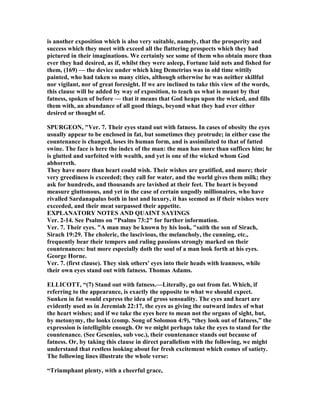
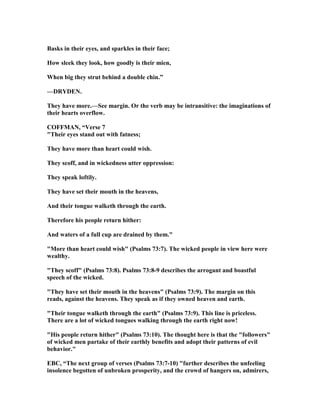
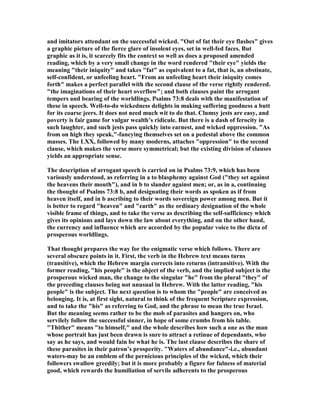
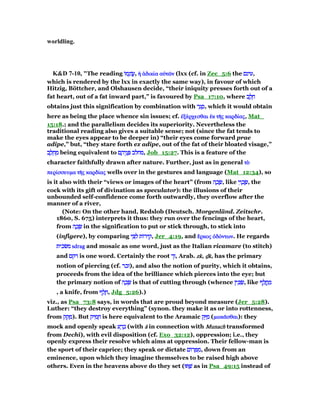
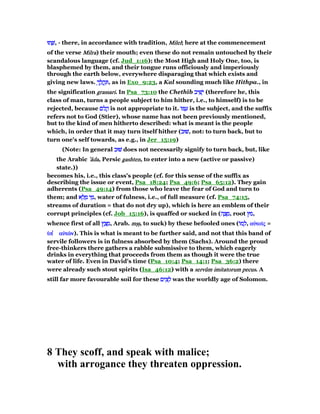
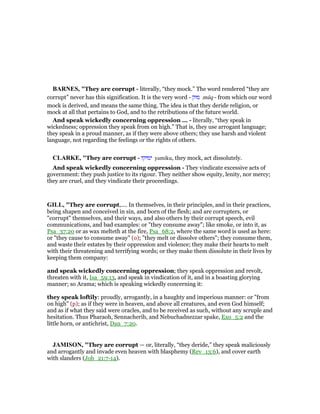
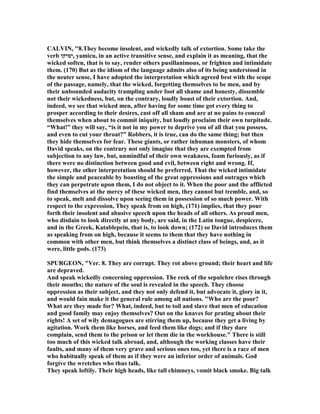
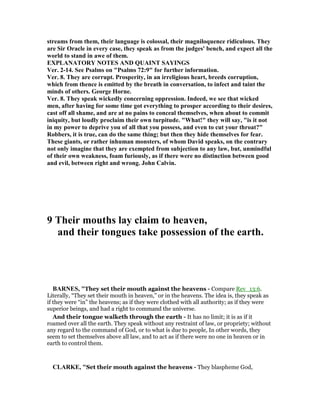
![ridicule religion, mock at Providence, and laugh at a future state.
Their tongue walketh through the earth - They find fault with every thing; they
traduce the memory of the just in heaven, and ridicule the saints that are upon earth.
They criticize every dispensation of God.
GILL, "They set their mouth against the heavens,.... Against God in heaven, see
Dan_4:26, against his being, saying, there is no God; against his perfections, thinking
him to be such an one as themselves; against his purposes and decrees, replying against
him, and charging him with insincerity, cruelty, and unrighteousness; and against his
providence, either denying it, or affirming it to be unequal; and against his doctrines,
ordinances, and ministers. Aben Ezra interprets it also of the angels of heaven, who are
spoken against, when it is denied that there are any such beings, as were by the
Sadducees; and blasphemed, when the worshipping of them is introduced. The Targum
understands it of the saints of heaven, with which compare Rev_13:6 it may be applied
to civil magistrates, the higher powers, who represent on earth God in heaven; and there
are some that despise dominion, and speak evil of such dignities:
and their tongue walketh through the earth: sparing none, high nor low, but
injures all sorts of persons with their lies and calumnies. This denotes the unbridled
liberty which wicked men take with their tongues; there is no restraint upon them, no
stopping of them; see Psa_12:5 the universal mischief they are continually doing, and
the diabolical influence of their detraction and falsehood; like Satan, their tongues walk
to and fro in the earth, doing all the injury to the credit and characters of men they
possibly can.
HE RY 9-12M "It made them very insolent in their demeanour towards both God
and man (Psa_73:9): They set their mouth against the heavens, putting contempt upon
God himself and his honour, bidding defiance to him and his power and justice. They
cannot reach the heavens with their hands, to shake God's throne, else they would; but
they show their ill-will by setting their mouth against the heavens. Their tongue also
walks through the earth, and they take liberty to abuse all that come in their way. No
man's greatness or goodness can secure him from the scourge of the virulent tongue.
They take a pride and pleasure in bantering all mankind; they are pests of the country,
for they neither fear God nor regard man. [4.] In all this they were very atheistical and
profane. They could not have been thus wicked if they had not learned to say (Psa_
73:11), How doth God know? And is there knowledge in the Most High? So far were they
from desiring the knowledge of God, who gave them all the good things they had and
would have taught them to use them well, that they were not willing to believe God had
any knowledge of them, that he took any notice of their wickedness or would ever call
them to an account. As if, because he is Most High, he could not or would not see them,
Job_22:12, Job_22:13. Whereas because he is Most High therefore he can, and will, take
cognizance of all the children of men and of all they do, or say, or think. What an affront
is it to the God of infinite knowledge, from whom all knowledge is, to ask, Is there
knowledge in him? Well may he say (Psa_73:12), Behold, these are the ungodly.
CALVI , "9.They have set their mouth against the heavens. Here it is declared that
they utter their contumelious speeches as well against God as against men; for they](https://image.slidesharecdn.com/psalm73commentary-160603141317/85/Psalm-73-commentary-61-320.jpg)
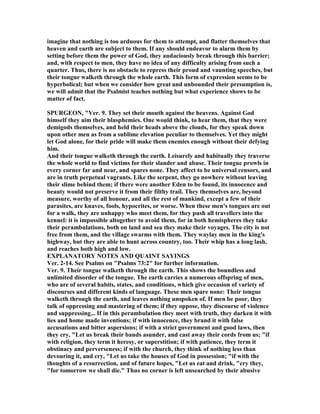
![tongue, which walks through the earth.... They may walk over the earth, but they
will set their mouth against the heavens. Here they stay, stand fixed and resolute,
and take that place, as a special white they would hit. Edward Parry.
10 Therefore their people turn to them
and drink up waters in abundance.[c]
BAR ES, "Therefore his people - Those that truly love God; the pious in the
earth.
Return hither - Return to this subject. In their musings - their meditations on
divine things - they come back to this inquiry. The subject occupies their minds, and
they recur to it as a subject which perplexes them; as a thing that is incomprehensible.
They think it over again and again, and are more and more perplexed and embarrassed.
The difficulties which these facts suggest about God and his government are such that
they cannot solve them.
And waters of a full cup are wrung out to them - literally, “waters of fullness;”
or, full waters. The Chaldee renders this, “Many tears flow from them.” The Septuagint,
and the Latin Vulgate, “And full days shall be found by them.” The word rendered “are
wrung out” - from מצה mâtsâh - means properly to “suck;” then, to suck out; to drink
greedily. See Isa_51:17. It is applied to one who drinks greedily of an intoxicating cup;
and then, to one who drinks a cup of poison to the dregs. Psa_75:8. The meaning here is,
that the facts in the case, and the questions which arose in regard to those facts, and
which so perplexed them, were like a bitter cup; a cup of poison, or an intoxicating cup
which overpowered their faculties - and that they, in their perplexities, “exhausted” the
cup. They drank it all, even to the dregs. They did not merely taste it; but they drank it. It
was a subject full of perplexity; a subject that wholly overpowered all their faculties, and
“exhausted” all their powers.
CLARKE, "Therefore his people return hither - There are very few verses in
the Bible that have been more variously translated than this; and, like the man in the
fable, they have blown the hot to cool it, and the cold to warm it. It has been translated,
“Therefore God’s people fall off to them; and thence they reap no small advantage.” And,
“Therefore let his people come before them; and waters in full measure would be wrung
out from them.” That is, “Should God’s people come before them, they would squeeze
them to the utmost; they would wring out all the juice in their bodies.” The Chaldee has,
“Therefore, are they turned against the people of the Lord, that they may bruise and beat
them with mallets; that they may pour out to them abundance of tears.” The Vulgate,](https://image.slidesharecdn.com/psalm73commentary-160603141317/85/Psalm-73-commentary-63-320.jpg)
![“Therefore shall my people return here, and days of abundance shall be found by them.”
The Septuagint is the same. The Ethiopic, Arabic, and Syriac, nearly the same. The
Hebrew text is, למו ימצו מלא ומי הלם עמו ישוב לכן lachen yashub ammo (עמי ammi) halom; umey
male yimmatsu lamo; “Therefore shall my people be converted, where they shall find
abundance of waters.” That is, The people, seeing the iniquity of the Babylonians, and
feeling their oppressive hand, shall be converted to me; and I shall bring them to their
own land, where they shall find an abundance of all the necessaries of life. I believe this
to be the meaning; and thus we find their afflictions were sanctified to them; for they
obliged them to return to God, and then God caused them to return to their own land.
The Vulgate translates מלא ומי umey male, “abundance of waters,” by et dies pleni, “and
days of plenty;” for it has read ימי yemey, days, for ומי umey, and waters. Almost all the
Versions support this reading; but it is not acknowledged by any MS. The old Psalter is
here mutilated.
GILL, "Therefore his people return hither,.... Either the true people of God, and
so the Targum, the people of the Lord, and whom the psalmist owned for his people; for
the Septuagint, Vulgate Latin, Syriac, Arabic, and Ethiopic versions, read "my people";
who seeing the prosperity of the wicked, and feeling their own afflictions, return to the
same way of thinking, and fall by the same snare and temptation as the psalmist did; or
such who were only the people of God by profession, but hypocrites, who observing the
trouble that attends a religious life, and the prosperity of wicked men, return from the
good ways of God they have outwardly walked in for some time, to the conversation of
these men, and join themselves to them: or else, "his" being put for "their", the sense is,
the people of these wicked men, of everyone of them, return unto them, and flock about
them, and caress and flatter them, because of their prosperous circumstances, and join
with them in their evil practices of oppression and slander; which sense seems best to
agree with what goes before and follows after:
and waters of a full cup are wrung out to them; meaning either to the people of
God, and to be understood either of the abundance of their tears, on account of their
afflictions inward and outward; see Psa_6:6, so the Targum,
"and many tears flow unto them;''
or of their afflictions themselves, which are oftentimes compared to waters in Scripture;
see Psa_42:7, which are given them in measure: it is a cup of them that is put into their
hands, and in full measure; they have a full cup of them; many are their tribulations,
through which they enter the kingdom, and they are all of God; it is he that wrings them
out to them with his fatherly hand: or else, taking the people to mean the followers and
companions of the wicked, the words are to be understood of the plenty of good things
which such men enjoy in this life, their cup runs over; and indeed these seem to be the
persons who are introduced speaking the following words.
HE RY, "He observed that while wicked men thus prospered in their impiety, and
were made more impious by their prosperity, good people were in great affliction, and he
himself in particular, which very much strengthened the temptation he was in to quarrel
with Providence. [1.] He looked abroad and saw many of God's people greatly at a loss
(Psa_73:10): “Because the wicked are so very daring therefore his people return hither;](https://image.slidesharecdn.com/psalm73commentary-160603141317/85/Psalm-73-commentary-64-320.jpg)
![they are at the same pause, the same plunge, that I am at; they know not what to say to it
any more than I do, and the rather because waters of a full cup are wrung out to them;
they are not only made to drink, and to drink deeply, of the bitter cup of affliction, but to
drink all. Care is taken that they lose not a drop of that unpleasant potion; the waters are
wrung out unto them, that they may have the dregs of the cup. They pour out abundance
of tears when they hear wicked people blaspheme God and speak profanely,” as David
did, Psa_119:136. These are the waters wrung out to them. [2.] He looked at home, and
felt himself under the continual frowns of Providence, while the wicked were sunning
themselves in its smiles (Psa_73:14): “For my part,” says he, “all the day long have I
been plagued with one affliction or another, and chastened every morning, as duly as
the morning comes.” His afflictions were great - he was chastened and plagued; the
returns of them were constant, every morning with the morning, and they continued,
without intermission, all the day long. This he thought was very hard, that, when those
who blasphemed God were in prosperity, he that worshipped God was under such great
affliction. He spoke feelingly when he spoke of his own troubles; there is no disputing
against sense, except by faith.
JAMISO , "Hence God’s people are confounded, turned hither (or back) and
thither, perplexed with doubts of God’s knowledge and care, and filled with sorrow.
CALVI , "10.On this account his people will return hither. Commentators wrest
this sentence into a variety of meanings. In the first place, as the relative his is used,
without an antecedent indicating whose people are spoken of, some understand it
simply of the ungodly, as if it had been said, That the ungodly always fall back upon
this reflection: and they view the word people as denoting a great troop or band; for
as soon as a wicked man raises his standard, he always succeeds in drawing a
multitude of associates after him. They, therefore, think the meaning to be, that
every prosperous ungodly man has people flocking about him, as it were, in troops;
and that, when within his palace or magnificent mansion, they are content with
getting water to drink; so much does this perverse imagination bewitch them. But
there is another sense much more correct, and which is also approved by the
majority of commentators; namely, that the people of God (175) return hither. Some
take the word ,הלם halom, which we have rendered hither, as denoting afflicted;
(176) but this is a forced interpretation.
The meaning is not, however, as yet, sufficiently evident, and therefore we must
inquire into it more closely. (177) Some read the whole verse connectedly, thus: The
people of God return hither, that they may drain full cups of the water of sorrow.
But, in my opinion, this verse depends upon the preceding statements, and the sense
is, That many who had been regarded as belonging to the people of God were
carried away by this temptation, and were even shipwrecked and swallowed up by
it. The prophet does not seem to speak here of the chosen people of God, but only to
point to hypocrites and counterfeit Israelites who occupy a place in the Church. He
declares that such persons are overwhelmed in destruction, because, being foolishly
led away to envy the wicked, and to desire to follow them, (178) they bid adieu to
God and to all religion. Still, however, this might, without any impropriety, be
referred to the chosen seed, many of whom are so violently harassed by this](https://image.slidesharecdn.com/psalm73commentary-160603141317/85/Psalm-73-commentary-65-320.jpg)
![temptation, that they turn aside into crooked by-paths: not that they devote
themselves to wickedness, but because they do not firmly persevere in the right path.
The sense then will be, that not only the herd of the profane, but even true believers,
who have determined to serve God, are tempted with this unlawful and perverse
envy and emulation. (179) What follows, Waters of a full cup are wrung out to them,
(180) seems to be the reason of the statement in the preceding clause, implying that
they are tormented with vexation and sorrow, when no advantage appears to be
derived from cultivating true religion. To be saturated with waters is put
metaphorically for to drink the bitterest distresses, and to be filled with
immeasurable sorrows.
“Therefore his [God’s] people sit woebegone.”
To make out this translation, he adopts another of the various readings of MSS.
“For ”,ישיב says he, “many MSS. have ישוב : I would transpose the vau, and read
.יושב The third person future, Hophal, signifies is made to sit, is settled, attended
with grief and consternation at the unpunished audacity of the profane.”
SPURGEO , "Ver. 10. Therefore his people return hither. God's people are driven
to fly to his throne for shelter; the doggish tongues fetch home the sheep to the
Shepherd. The saints come again, and again, to their Lord, laden with complaints on
account of the persecutions which they endure from these proud and graceless men.
And waters of a full cup are wrung out to them. Though beloved of God, they have
to drain the bitter cup; their sorrows are as full as the wicked man's prosperity. It
grieves them greatly to see the enemies of God so high, and themselves so low, yet
the Lord does not alter his dispensations, but continues still to chasten his children,
and indulge his foes. The medicine cup is not for rebels, but for those whom
Jehovah Rophi loves.
EXPLA ATORY OTES A D QUAI T SAYI GS
Ver. 2-14. See Psalms on "Psalms 73:2" for further information.
Ver. 10. Therefore his people return hither. It seems impossible to ascertain, with
any degree of precision, the meaning of this verse, or to whom it relates. Some think
it intends those people who resort to the company of the wicked, because they find
their temporal advantage by it; while others are of opinion that the people of God
are meant, who, by continually revolving in their thoughts the subject here treated
of, namely, the prosperity of the wicked, are sore grieved and forced to shed tears in
abundance. Mr. Mudge translates the verse thus: Therefore let his (God's) people
come before them, and waters in full measure would be wrung out from them; that
is, should God's people fall into their hands, they would squeeze them to the full,
they would wring out all the juice out of their bodies. He takes waters in full
measure to have been a proverbial expression. Samuel Burder.
BE SO , "Psalms 73:10. Therefore his people return hither — “It seems
impossible to ascertain,” says Dr. Horne, “with any degree of precision, the meaning
of this verse, or to whom it relates. Some think it intends those people who resort to
the company of the wicked, because they find their temporal advantage by it; while](https://image.slidesharecdn.com/psalm73commentary-160603141317/85/Psalm-73-commentary-66-320.jpg)
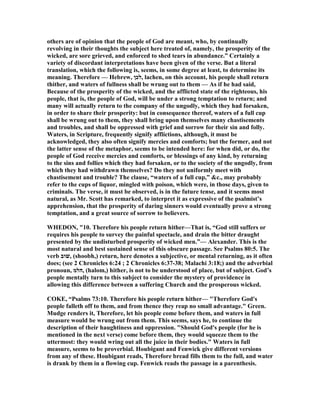
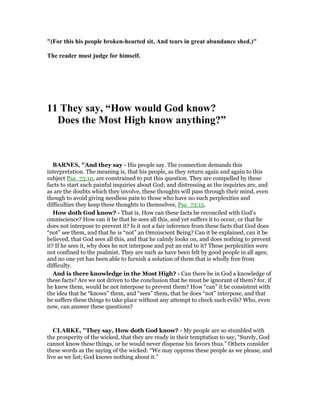
![GILL, "And they say, how doth God know?.... Owning there is a God, but
questioning his knowledge; for the words are not an inquiry about the way and manner
of his knowing things; which is not by the senses, as hearing and seeing; eyes and ears
are improperly ascribed to him; nor in a discursive way, by reasoning, and inferring one
thing from another; for he knows things intuitively, beholding all things in his own
eternal mind and will: but they are a question about his knowledge itself, as follows:
and is their knowledge in the most High? they acknowledge God to be the most
High, and yet doubt whether there is knowledge in him; and indeed the higher with
respect to place, and at the greater distance he was from them, the less they imagined he
knew of affairs below; see Job_22:13 for the knowledge called in question is to be
understood of his providential notice of human affairs, which they thought he did not
concern himself with, as being below his regard; see Eze_9:9 and therefore concluded
that their acts of oppression and violence, and their insolent words against God and
men, would pass unobserved, and with impunity. If these are the words of good men, of
the people of God under affliction, they are to be considered as under a temptation from
their affliction, and the prosperity of the wicked, to call in question the providence of
God in the government of the world, and his love to them, which is sometimes expressed
by his knowledge of them, Psa_1:6.
HE RY 11--13," From all this arose a very strong temptation to cast off his religion.
[1.] Some that observed the prosperity of the wicked, especially comparing it with the
afflictions of the righteous, were tempted to deny a providence and to think that God had
forsaken the earth. In this sense some take Psa_73:11. There are those, even among
God's professing people, that say, “How does God know? Surely all things are left to
blind fortune, and not disposed of by an all-seeing God.” Some of the heathen, upon
such a remark as this, have asked, Quis putet esse deos? - Who will believe that there are
gods? [2.] Though the psalmist's feet were not so far gone as to question God's
omniscience, yet he was tempted to question the benefit of religion, and to say (Psa_
73:13), Verily, I have cleansed my heart in vain, and have, to no purpose, washed my
hands in innocency. See here what it is to be religious; it is to cleanse our hearts, in the
first place, by repentance and regeneration, and then to wash our hands in innocency by
a universal reformation of our lives. It is not in vain to do this, not in vain to serve God
and keep his ordinances; but good men have been sometimes tempted to say, “It is in
vain,” and “Religion is a thing that there is nothing to be got by,” because they see
wicked people in prosperity. But, however the thing may appear now, when the pure in
heart, those blessed ones, shall see God (Mat_5:8), they will not say that they cleansed
their hearts in vain.
CALVI , "Verse 11
11.And they say, How doth God know? Some commentators maintain that the
Prophet here returns to the ungodly, and relates the scoffings and blasphemies with
which they stimulate and stir up themselves to commit sin; but of this I cannot
approve. David rather explains what he had stated in the preceding verse, as to the
fact that the faithful fall into evil thoughts and wicked imaginations when the short-
lived prosperity of the ungodly dazzles their eyes. He tells us that they begin then to
call in question, Whether there is knowledge in God. Among worldly men, this](https://image.slidesharecdn.com/psalm73commentary-160603141317/85/Psalm-73-commentary-69-320.jpg)
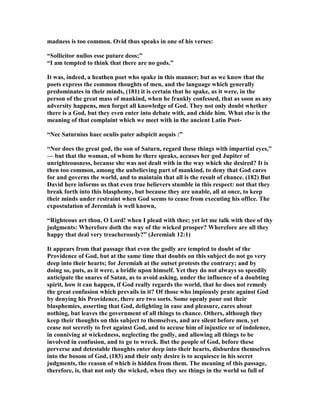
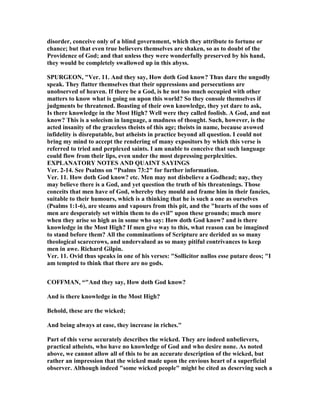
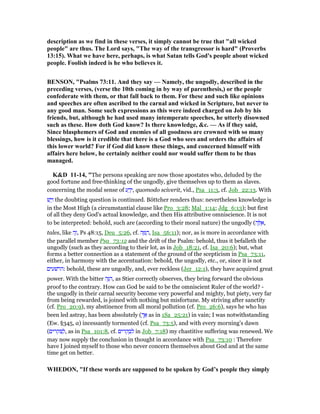
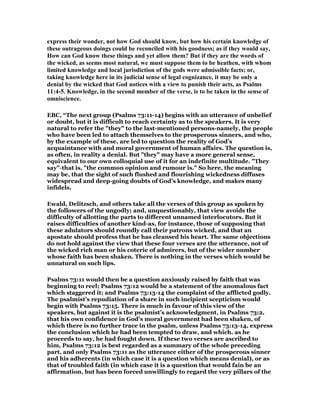
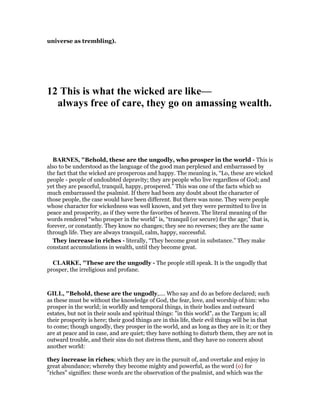
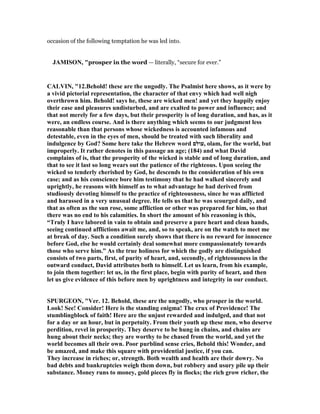
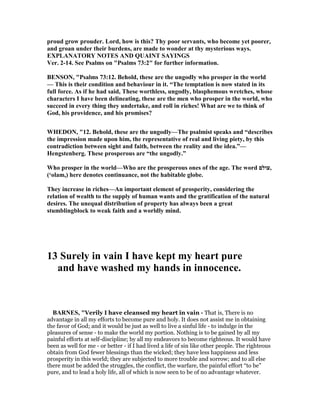
![Such thoughts as these were not confined to the psalmist. They are thoughts which will
start up in the mind, and which it is not easy to calm down.
And washed my hands in innocency - That is, It has been of no use that I have
washed my hands in innocency. The word “innocency” here means “purity.” He had
washed his hands in that which was pure; as, pure water. To wash the hands is
emblematic of innocence or purity. See the notes at Psa_26:6.
CLARKE, "I have cleansed my heart in vain - It is no advantage to us to
worship the true God, to walk according to the law of righteousness, and keep the
ordinances of the Most High.
GILL, "Verily, I have cleansed my heart in vain,.... Which supposes that his heart
had been unclean, as every man's is, and which appears by what is in it, and by what
comes out of it; that it was now cleansed, not in an absolute and legal sense, as if it was
wholly free from sin, for this no man can say; but in an evangelical sense, being purified
by faith in the blood of Christ; that he had himself some concern in the cleansing of his
heart, which seems to be contrary to Pro_20:9 and besides, this is the Lord's own work,
Psa_51:10 wherefore this may be considered as a wrong and rash expression of his; for
as he was wrong in one part of it, its being cleansed in vain, so he might be in the other,
in ascribing it to himself; though it may be allowed, consistent with what is before
observed, that a believer has a concern in the cleansing of his heart; for, being convinced
of the impurity of it, he owns and laments it before the Lord; and, seeing the fountain of
the Redeemer's blood opened, he applies to it, and to him for cleansing; and expresses a
love unto, a great and studious concern for purity of heart as well as life; and, under the
influence of divine grace, is enabled to keep a watch over it, whereby, through the same
grace, it is preserved from much pollution; and by fresh application to the blood of
Christ, is cleansed from what it daily contracts:
and washed my hands in innocency: that is, "in vain", as before; which denotes the
performance of good works, a course of holy life and conversation, which when right
springs from purity of heart; See Gill on Psa_26:6, now the psalmist under temptation
concluded that all his religion and devotion were in vain, all his hearing, and reading,
and attending on ordinances, all his concern for purity of heart and life; since those who
showed no regard to these things prospered in the world, and increased in riches,
abounded in ease and plenty, and seemed to be rather the favourites of heaven than
religious men; and this temptation was strengthened by the following observation.
HE RY, " From all this arose a very strong temptation to cast off his religion. [1.]
Some that observed the prosperity of the wicked, especially comparing it with the
afflictions of the righteous, were tempted to deny a providence and to think that God had
forsaken the earth. In this sense some take Psa_73:11. There are those, even among
God's professing people, that say, “How does God know? Surely all things are left to
blind fortune, and not disposed of by an all-seeing God.” Some of the heathen, upon
such a remark as this, have asked, Quis putet esse deos? - Who will believe that there are
gods? [2.] Though the psalmist's feet were not so far gone as to question God's
omniscience, yet he was tempted to question the benefit of religion, and to say (Psa_
73:13), Verily, I have cleansed my heart in vain, and have, to no purpose, washed my](https://image.slidesharecdn.com/psalm73commentary-160603141317/85/Psalm-73-commentary-77-320.jpg)
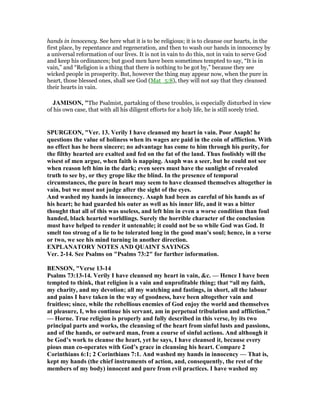
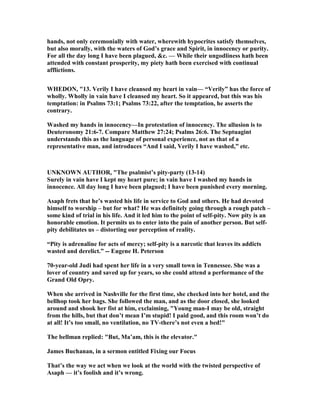
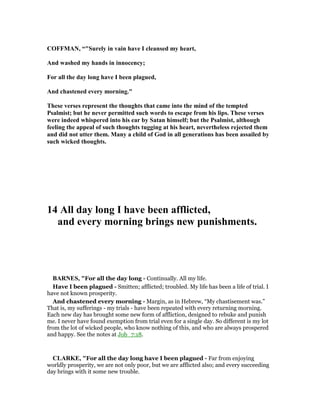
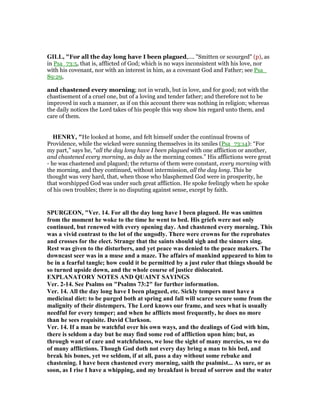
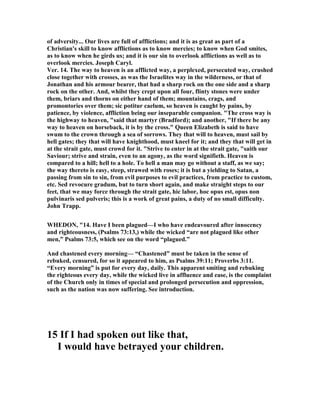
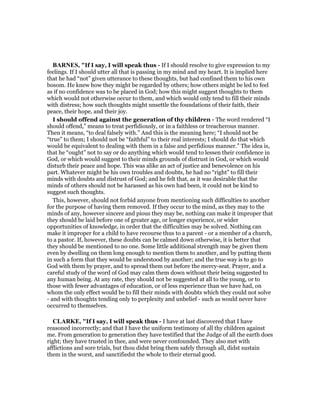
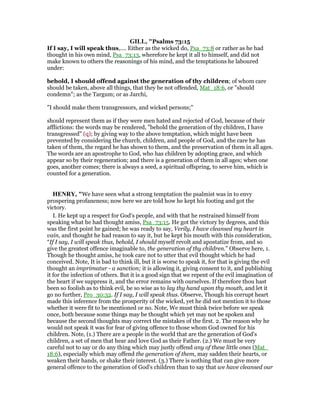
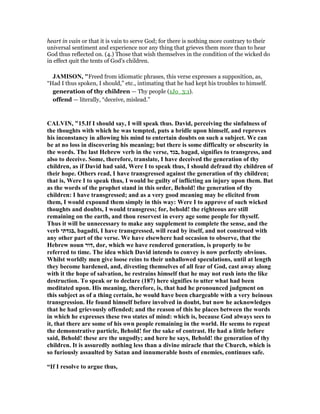
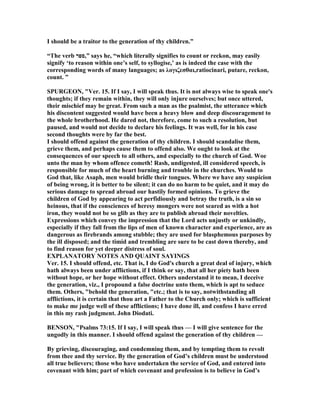
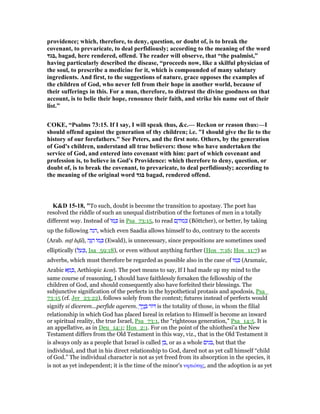
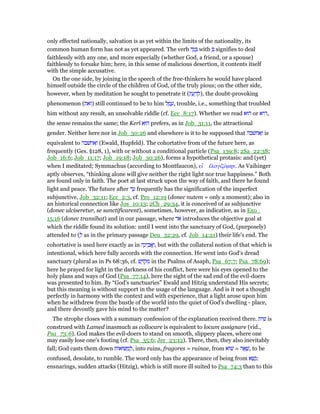
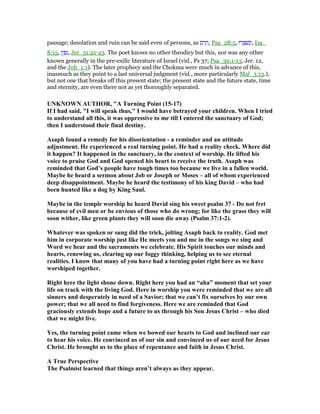
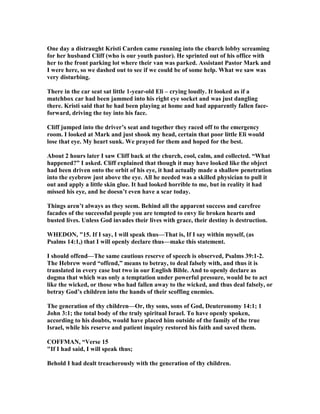
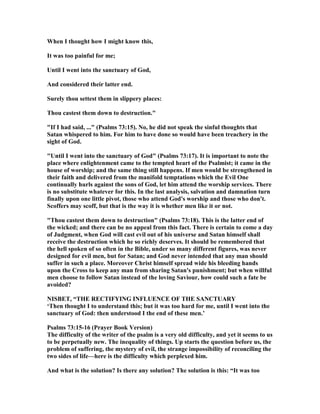
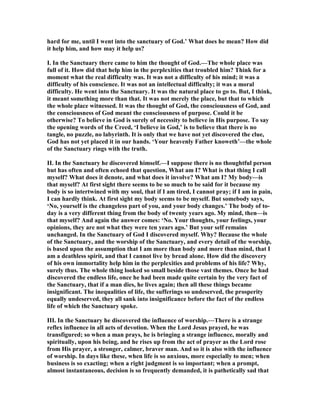
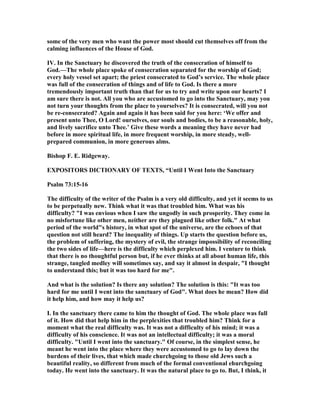
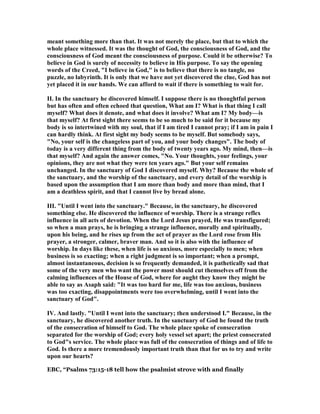
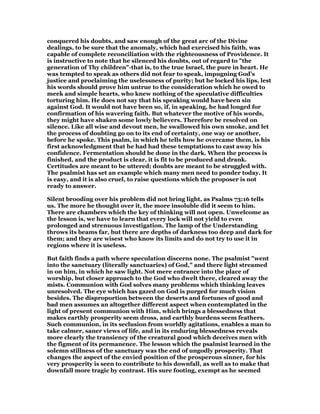
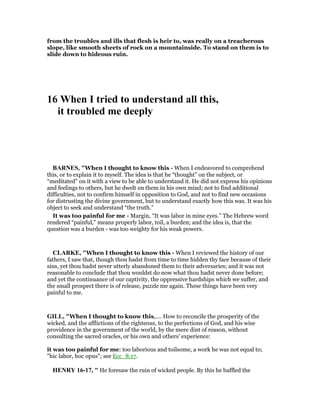
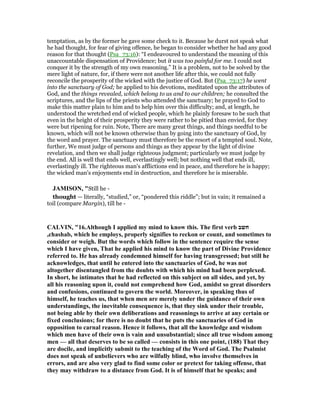
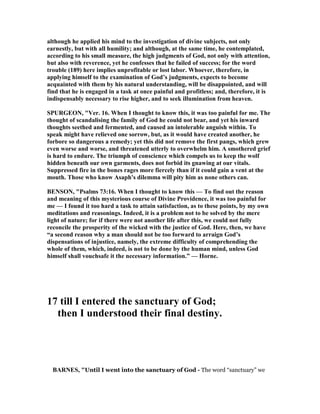
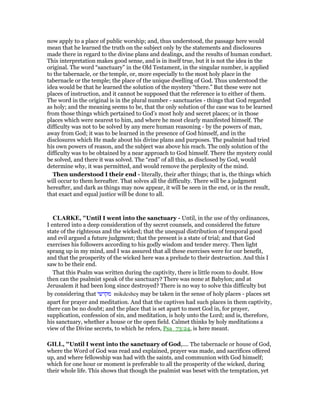
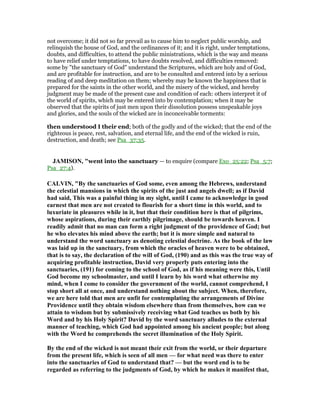
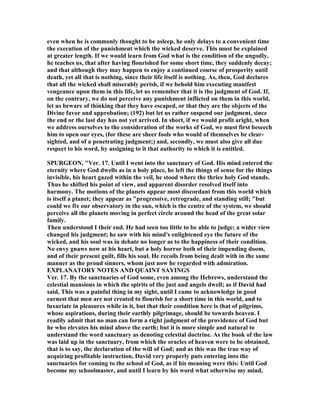
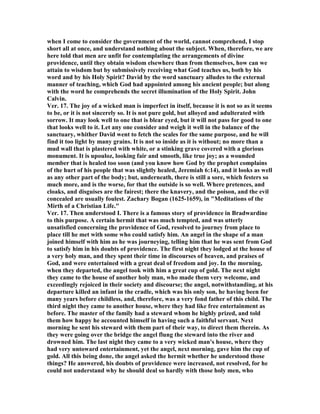
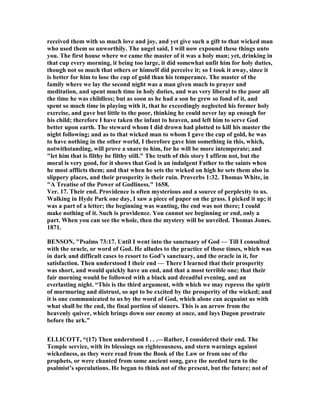
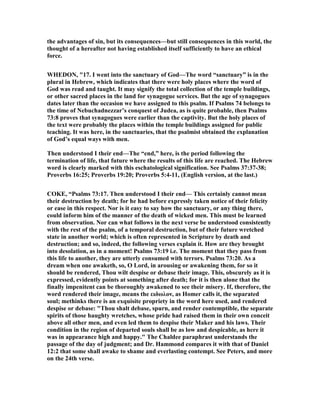
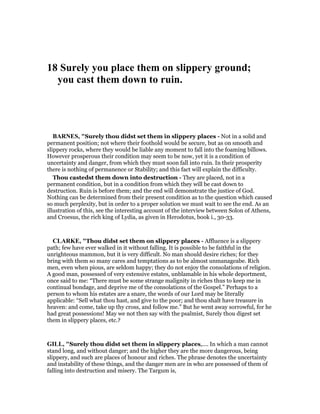
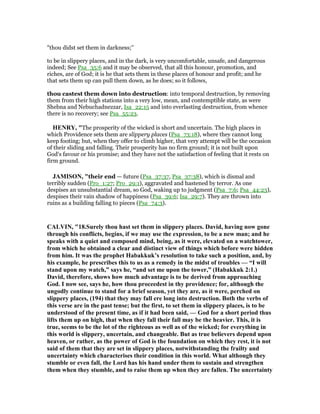
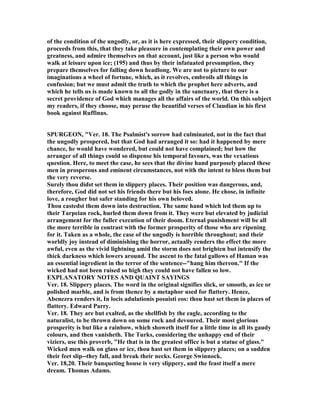
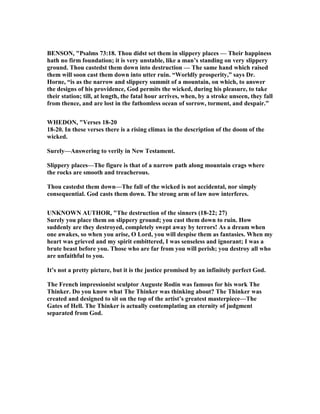
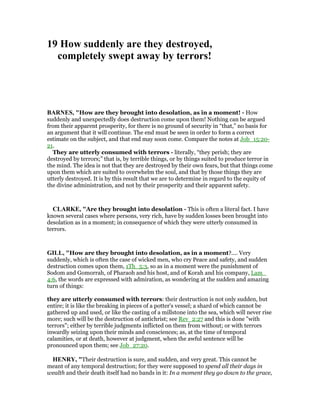
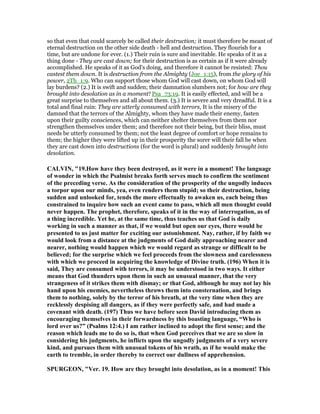
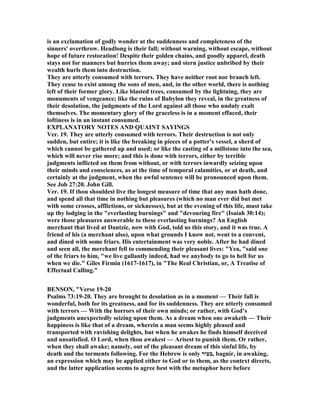
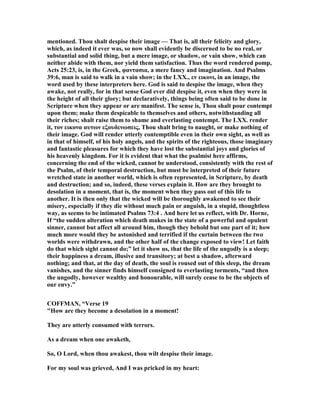
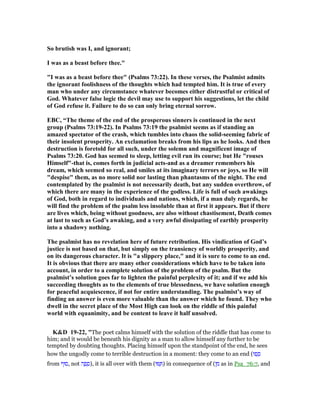
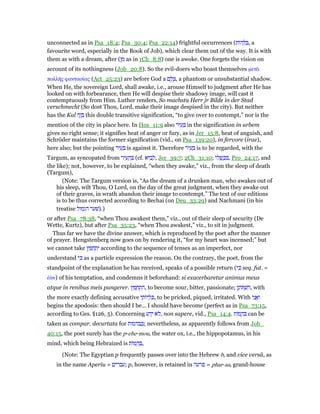
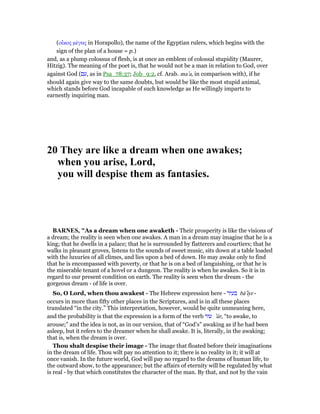
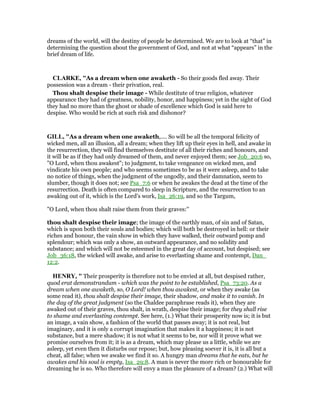
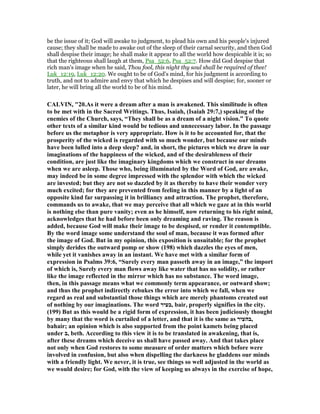
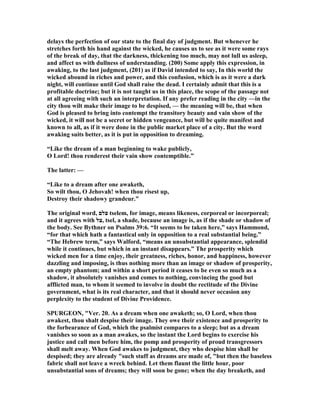
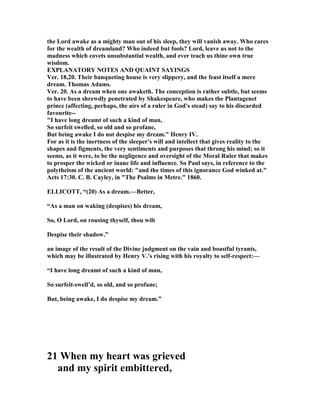
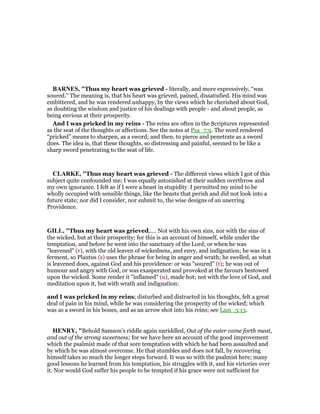
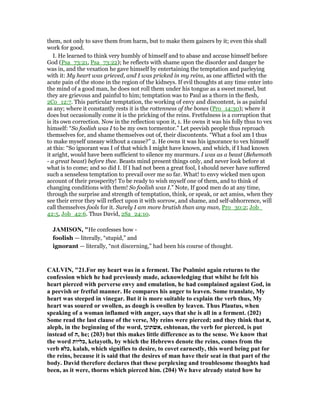
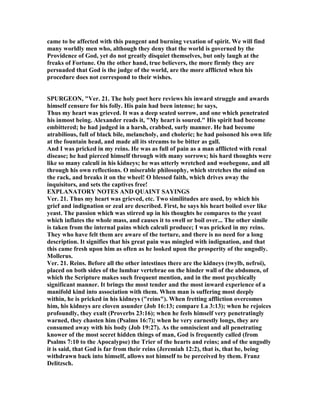
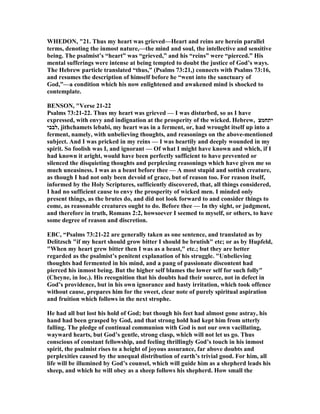
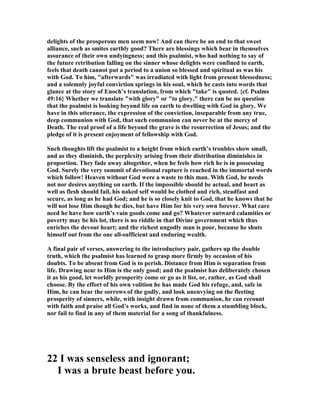
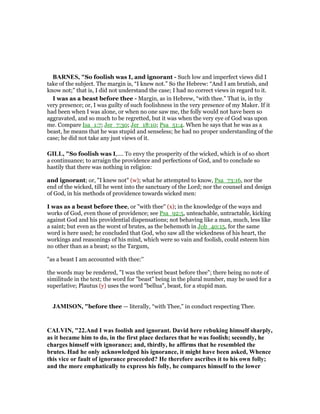
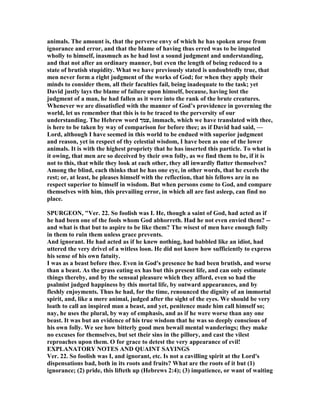
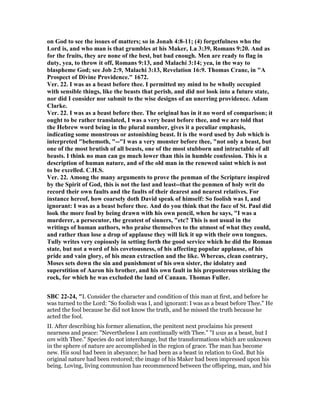
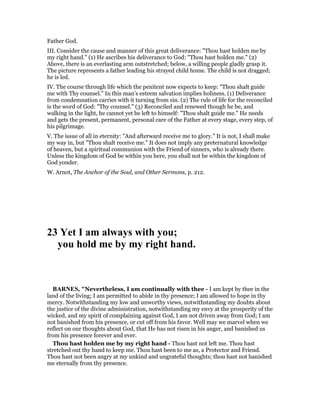
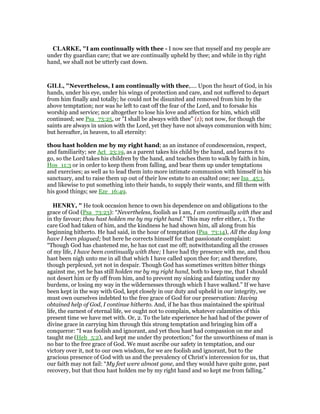
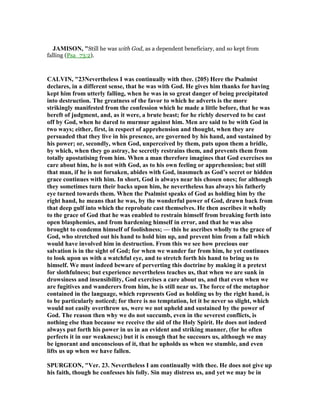
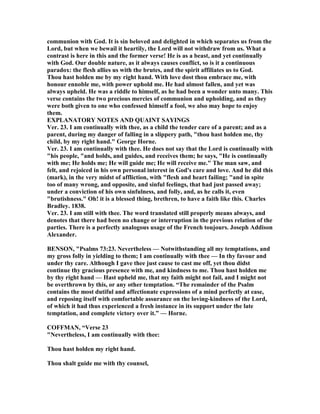
![And afterward receive me to glory.
Whom have I in heaven but thee?
And there is none upon earth that I desire besides thee.
My flesh and my heart faileth;
But God is the strength of my heart and my portion forever."
What a marvelous affirmation of faith in God is made here. The answer to all of
earth's inequities, maladjustments, injustices, and wretchedness is not to be
expected in this life. Over against all of the misfortunes and sorrows of the
redeemed there is written the glorious words of the Son of God, "Great is your
reward in heaven."
"And afterward receive me to glory"! (Psalms 73:24). Here is another glorious Old
Testament text promising the resurrection of the dead and the entry of the saints of
God into everlasting blessedness. As an apostle has stated it:
"For our light affliction, which is for the moment, worketh for us more and more
exceedingly an eternal weight of glory; while we look not at the things which are
seen, but at the things which are not seen; for the things which are seen are
temporal; but the things which are not seen are eternal" (2 Corinthians 4:17-18).
"Whom have I in heaven but thee" (Psalms 73:25). These beautiful words were
utilized by Fanny J. Crosby:
"Thou the spring of all my comfort,
More than life to me.
Whom have I on earth beside thee,
Whom in heav'n but thee."[6]SIZE>
K&D 23-26, "But he does not thus deeply degrade himself: after God has once taken
him by the right hand and rescued him from the danger of falling (Psa_73:2), he clings
all the more firmly to Him, and will not suffer his perpetual fellowship with Him to be
again broken through by such seizures which estrange him from God. confidently does
he yield up himself to the divine guidance, though he may not see through the mystery of
the plan (ה ַצ ֵ)ע of this guidance. He knows that afterwards (ר ַחፍ with Mugrash: adverb as
in Psa_68:26), i.e., after this dark way of faith, God will ּודב ָכ receive him, i.e., take him to
Himself, and take him from all suffering (ח ַק ָל as in Psa_49:16, and of Enoch, Gen_5:24).
The comparison of Zec_2:12 [8] is misleading; there ר ַחፍ is rightly accented as a
preposition: after glory hath He sent me forth (vid., Köhler), and here as an adverb; for
although the adverbial sense of אחר would more readily lead one to look for the](https://image.slidesharecdn.com/psalm73commentary-160603141317/85/Psalm-73-commentary-132-320.jpg)
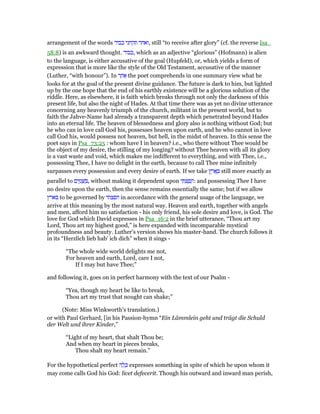
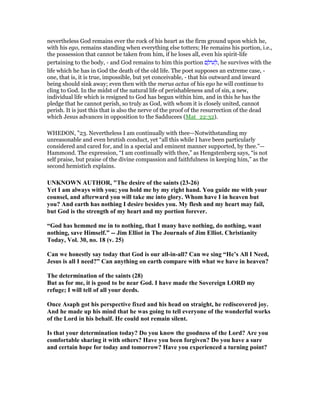
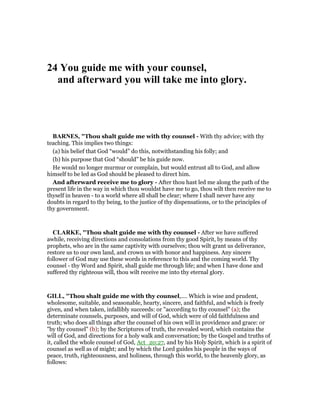
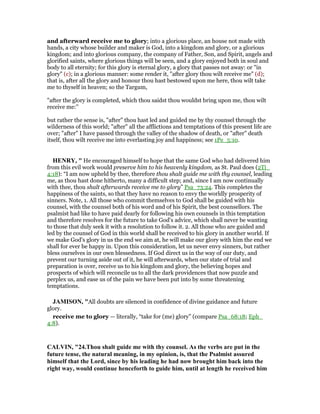
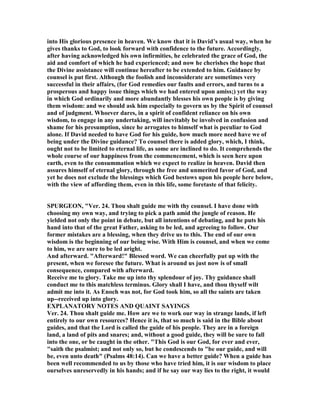
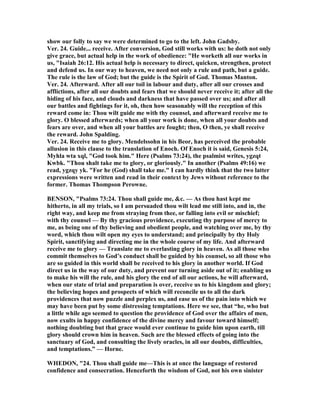
![reasonings, should be the governing and directing power of his life.
And afterward receive me to glory— “Glory,” here, must be understood in its
spiritual and eschatological sense as the blessedness which the godly shall receive
after death, and is the opposite of the pleasures and rewards of wicked men. The
whole context requires this, and it is implied in the verb “receive,” the same word as
is used of Enoch, (Genesis 5:24,) “For God took him,” and Psalms 49:15, “God shall
redeem my soul from the power of the grave, for he shall receive me;” instances in
which no other sense can be given than that of final blessedness with God. ,אחר
(ahhar,) translated after, (which is sometimes used adverbially, as Judges 19:5, and
sometimes as a preposition, as Zechariah 2:8,) must here be taken as an adverb.
This accords with commentators generally, and with the authorized English
Version. All attempts to translate the word prepositionally are obscure and
unsatisfactory, as in the following examples: “After honour (glory) thou takest me,”
that is, after it as an aim, and so “Thou takest me and bringest me in its train,”
(Hengstenberg,) or, “Thou leadest me after glory,” (Hitzig, Ewald.) Such renderings
give no appreciable sense, and are as opposed to the scope of the author as to the
analogy of revelation and the facts of history. It is not to any state or result in this
life that God has ever yet led his suffering, spiritual Church, as the ultimate goal of
spiritual aim and desire, or as an antidote to temptation such as had well nigh
stumbled the psalmist. Besides, as translations, the quotations just given cannot be
accepted. The first, (“after honour [as an aim] thou takest me,”) is unintelligible;
and the second, (“Thou leadest me after glory,”) uses ,לקח (lakahh,) in an
unauthorized sense. The word occurs about nine hundred and fifty times in the Old
Testament, and never means lead, but always to take, take away, receive, bring, etc.
The proper word for lead, ,נחה (nahhah,) had already been used in the previous
member of the verse. “Thou shall guide [lead] me with thy counsel.” The life to come
alone can explain the words of the psalmist. The counsel of God, which was to
“guide” him henceforth, still involved that mysterious purpose of providence which
allowed the wicked to prosper in contempt of God, while the righteous should often
remain in affliction and oppression. But the discovery of the “end” of the wicked
(see on Psalms 73:17 ) had corrected his error and restored his staggering faith. In
this faith he now submissively walks on, led by “the counsel of God,” still
unexplained, till the rewards of a future life should unfold all and compensate all.
See notes on Psalms 37. With this view the closing verses coincide.
COKE, “Psalms 73:24. Thou shalt guide me with thy counsel, &c.— See Psalms
49:15. That the future wretched state of wicked men is understood in the preceding
verses, seems further evident, from its being opposed to the happy state of the
righteous in this verse; where the very term glory is used, whereby the happiness of
heaven is described in the ew Testament. The two next verses are no less
remarkable; for no Christian could express his hope of being for ever with God in
more apt words. It follows, Psalms 73:27. They that forsake thee shall perish. What
can be meant by this, but the future perdition of wicked men? For, do they perish?
i.e. Are they certainly punished here? Are they so universally? if not, How is it
possible to understand these words of any thing temporal? or how, in short, can this
knot be untied, this difficulty solved, which has so often perplexed good men, but by](https://image.slidesharecdn.com/psalm73commentary-160603141317/85/Psalm-73-commentary-139-320.jpg)
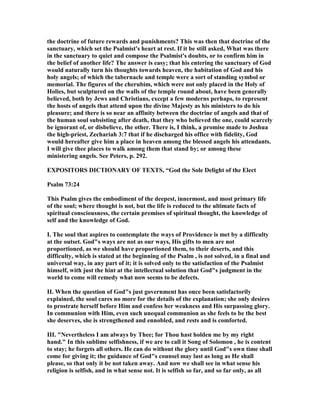
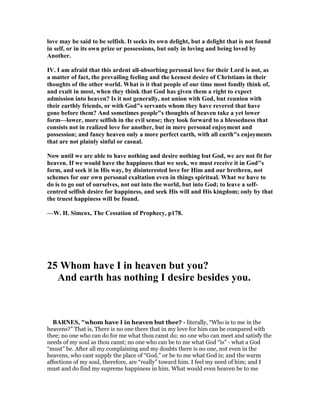
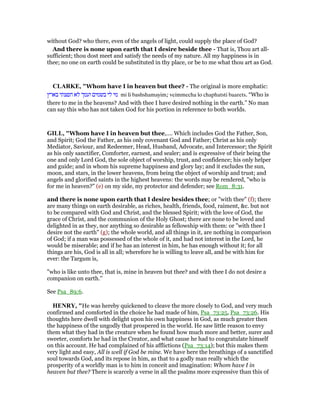
![the pious and devout affections of a soul to God; here it soars up towards him, follows
hard after him, and yet, at the same time, has an entire satisfaction and complacency in
him.
1. It is here supposed that God alone is the felicity and chief good of man. He, and he
only, that made the soul, can make it happy; there is none in heaven, none in earth, that
can pretend to do it besides.
2. Here are expressed the workings and breathings of a soul towards God accordingly.
If God be our felicity,
(1.) Then we must have him (Whom have I but thee?), we must choose him, and make
sure to ourselves an interest in him. What will it avail us that he is the felicity of souls if
he be not the felicity of our souls, and if we do not by a lively faith make him ours, by
joining ourselves to him in an everlasting covenant?
(2.) Then our desire must be towards him and our delight in him (the word signifies
both); we must delight in what we have of God and desire what we yet further hope for.
Our desires must not only be offered up to God, but they must all terminate in him,
desiring nothing more than God, but still more and more of him. This includes all our
prayers, Lord, give us thyself; as that includes all the promises, I will be to them a God.
The desire of our souls is to thy name.
(3.) We must prefer him in our choice and desire before any other. [1.] “There is none
in heaven but thee, none to seek to or trust in, none to court or covet acquaintance with,
but thee.” God is in himself more glorious than any celestial being (Psa_89:6), and must
be, in our eyes, infinitely more desirable. Excellent beings there are in heaven, but God
alone can make us happy. His favour is infinitely more to us than the refreshment of the
dews of heaven or the benign influence of the stars of heaven, more than the friendship
of the saints in heaven or the good offices of the angels there. [2.] I desire none on earth
besides thee; not only none in heaven, a place at a distance, which we have but little
acquaintance with, but none on earth neither, where we have many friends and where
much of our present interest and concern lie. “Earth carries away the desires of most
men, and yet I have none on earth, no persons, no things, no possessions, no delights,
that I desire besides thee or with thee, in comparison or competition with thee.” We
must desire nothing besides God but what we desire for him (nil praeter te nisi propter
te - nothing besides thee except for thy sake), nothing but what we desire from him, and
can be content without so that it be made up in him. We must desire nothing besides
God as needful to be a partner with him in making us happy.
JAMISO , "God is his only satisfying good.
CALVI , "25.Whom have I in heaven but thee? The Psalmist shows more distinctly
how much he had profited in the sanctuary of God; for being satisfied with him
alone, he rejects every other object, except God, which presented itself to him. The
form of expression which he employs, when he joins together an interrogation and
an affirmation, is quite common in the Hebrew tongue, although harsh in other
languages. As to the meaning, there is no ambiguity. David declares that he desires
nothing, either in heaven or in earth, except God alone, and that without God, all
other objects which usually draw the hearts of men towards them were unattractive
to him. And, undoubtedly, God then obtains from us the glory to which he is
entitled, when, instead of being carried first to one object, and then to another, we
hold exclusively by him, being satisfied with him alone. If we give the smallest](https://image.slidesharecdn.com/psalm73commentary-160603141317/85/Psalm-73-commentary-143-320.jpg)
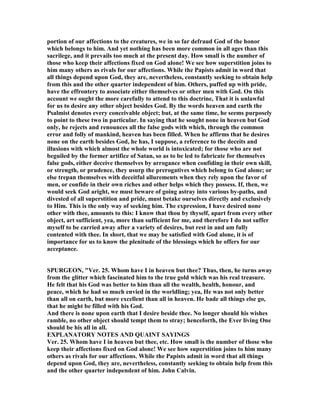
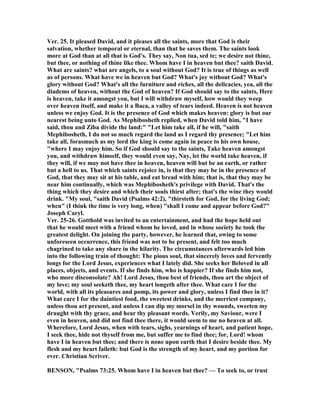
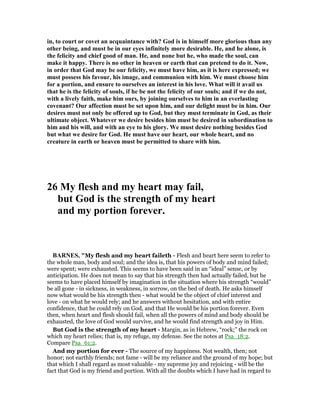
![the rectitude of his government, I am sure that when I come to die, I shall cling to him as
my hope, my joy, my all. My last refuge - my sufficient refuge - is God. When people
come to die, they have “no other refuge” but God. Nothing that they can accumulate of
this world’s goods will meet their needs then, for God only can give strength and comfort
on the bed of death. Of each and all, however vigorous they may now be, it will be true
that “flesh and heart” will “fail;” of each and all it is true that when this shall occur, none
but God can be the portion and the strength of the soul.
CLARKE, "My flesh - faileth - I shall soon die: and my heart - even my natural
courage, will fail; and no support but what is supernatural will then be available.
Therefore, he adds:
God is the strength of my heart - Literally, the rock of my heart.
And my portion - Allusion is here made to the division of the promised land. I ask
no inheritance below; I look for one above. I do not look for this in the possession of any
place; it is God alone that can content the desires and wishes of an immortal spirit. And
even this would not satisfy, had I not the prospect of its being for ever, לעולם leolum, “to
eternity!’
GILL, "My flesh and my heart faileth,.... Either through vehement desires of
communion with God deferred, see Psa_84:2 or through afflictive dispensations of
Providence, being smitten and chastened continually, Psa_73:14, or through inward
trials and exercises, by reason of indwelling sin, temptations, and desertions: or rather
the words are expressive of the body being emaciated by sickness and diseases; and the
heart fainting through fear of death, or rather failing at it, being at the point of death; the
heart being, as philosophers say, the first that lives, and the last that dies:
but God is the strength of my heart, or "the rock of my heart" (h); when
overwhelmed with distress through outward trouble, or in the lowest condition with
respect to spiritual things; when grace is weak, corruptions strong, temptations prevail,
and afflictions are many; then does the Lord support and sustain his people, and
strengthens them with strength in their souls; and in the moment of death, by showing
them that its sting is taken away, and its curse removed; that their souls are going to
their Lord, and about to enter into his joy; and that their bodies will rise again glorious
and incorruptible:
and my portion for ever; both in life and at death, and to all eternity; this is a very
large portion indeed; such who have it inherit all things; yea, it is immense and
inconceivable; it is a soul satisfying one, and is safe and secure; it can never be taken
away, nor can it be spent; it will last always; see Psa_142:5.
HE RY, "Then we must repose ourselves in God with an entire satisfaction, Psa_
73:26. Observe here, [1.] Great distress and trouble supposed: My flesh and my heart
fail. Note, Others have experienced and we must expect, the failing both of flesh and
heart. The body will fail by sickness, age, and death; and that which touches the bone
and the flesh touches us in a tender part, that part of ourselves which we have been but
too fond of; when the flesh fails the heart is ready to fail too; the conduct, courage, and](https://image.slidesharecdn.com/psalm73commentary-160603141317/85/Psalm-73-commentary-147-320.jpg)
![comfort fail. [2.] Sovereign relief provided in this distress: But God is the strength of my
heart and my portion for ever. Note, Gracious souls, in their greatest distresses, rest
upon God as their spiritual strength and their eternal portion. First, “He is the strength
of my heart, the rock of my heart, a firm foundation, which will bear my weight and not
sink under it. God is the strength of my heart; I have found him so; I do so still, and
hope ever to find him so.” In the distress supposed, he had put the case of a double
failure, both flesh and heart fail; but, in the relief, he fastens on a single support: he
leaves out the flesh and the consideration of that, it is enough that God is the strength of
his heart. He speaks as one careless of the body (let that fail, there is no remedy), but as
one concerned about the soul, to be strengthened in the inner man. Secondly, “He is my
portion for ever; he will not only support me while I am here, but make me happy when
I go hence.” The saints choose God for their portion, they have him for their portion, and
it is their happiness that he will be their portion, a portion that will last as long as the
immortal soul lasts.
JAMISO , "strength — literally, “rock” (Psa_18:2).
portion — (Psa_16:5; Lam_3:24).
SBC, "I. Life and immortality, we are told, were brought to light by the Gospel. But the
immortality of the soul was not first taught and believed when our Lord confuted
Sadducean unbelief, or when He consoled His faint-hearted disciples on the eve of His
Passion. The doctrine of immortality runs through the Bible. It underlies the history of
the creation and the fall of man. It is involved in the statement that man was created
originally in the image of God.
II. The authority of our Lord Jesus Christ, Divine and infallible, is the true and sufficient
basis of this doctrine in the Christian soul.
III. In contemporary literature the word "immortality" is clung to with a desperate
tenacity which proves how, in spite of their theories, men shrink from resigning
themselves to the naked idea of absolute annihilation. Some believe in the immortality of
matter, others in that of force, others in that of thought, and others in that of moral
effort.
IV. The only immortality which can aspire permanently to interest and influence
mankind must assert that the life of the soul in perpetuity is an objective fact, altogether
independent of our mental conceptions, nay even of our moral activities. A real
immortality is an objective fact; it is also the immortality of a personal life.
V. The words of the text are in all ages the exulting voice of the conviction, of the
instinct, of the sense, of immortality in the servants of God. He upholds them in being,
and His eternity is to be the measure of their own endless life.
H. P. Liddon, University Sermons, 1st series, p. 107.
CALVI , "26.My flesh and my heart have failed. Some understand the first part of
the verse as meaning that David’s heart and flesh failed him through the ardent
desire with which he was actuated; and they think that by it he intends to testify the
earnestness with which he applied his mind to God. We meet with a similar form of
expression elsewhere; but the clause immediately succeeding, God is the strength of](https://image.slidesharecdn.com/psalm73commentary-160603141317/85/Psalm-73-commentary-148-320.jpg)
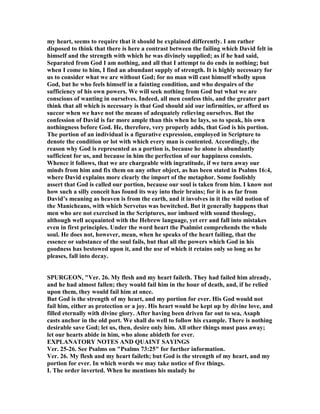
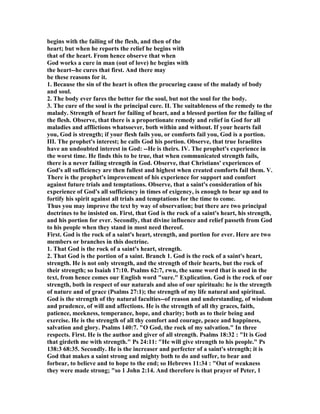
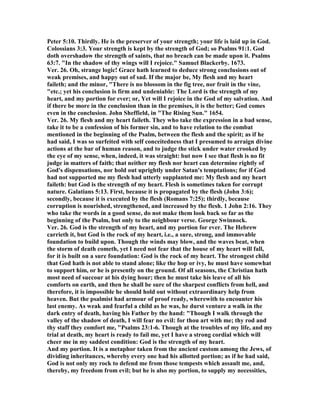
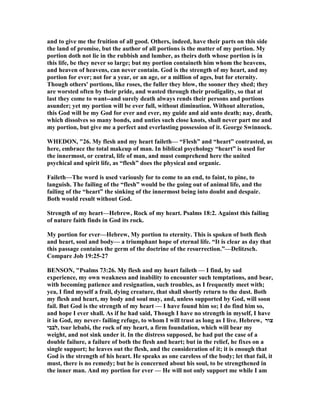
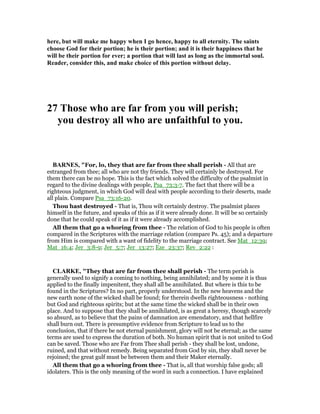
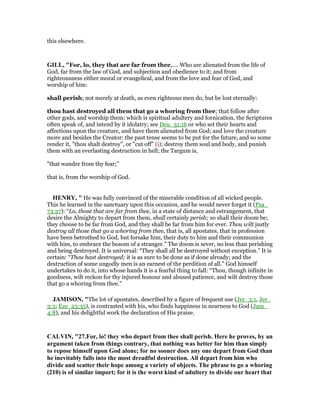
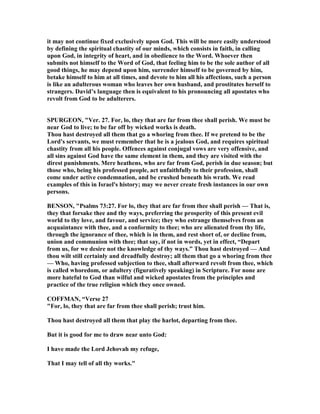
![These final two verses of the Psalm contrast the status of the wicked and of the
righteous. The wicked shall perish; but God Himself shall be the refuge of them that
trust him.
"Thou hast destroyed all them that play the harlot" (Psalms 73:27). This very
strong language does not appear often in the Psalms, but is not unusual elsewhere in
the Old Testament. This expression was ordinarily used to describe the sins of the
Israelites who forsook the true worship of God and indulged in the licentious
worship of the pagan deities in the groves and shrines dedicated to that purpose.
The words are not inappropriate, because the chief attractiveness of that pagan
worship to the Israelites was the sensual appeal of the [~qadesh] and the
[~qªdeshah] (the religious prostitutes) associated with the old Canaanite cults. Israel
had been commanded to destroy these; but they did not do so, and instead
patronized and supported them.
"It is good for me to draw near unto God" (Psalms 73:18). It is an invariable law of
God that bodies in space are mutually attracted; and the same truth holds in the
spiritual realm also. One who draws near to God will find that God also draws near
to him. earness to God is the "Great Good." othing else can approach the
desirability of the soul's being near to the Creator. "Draw nigh to God, and he will
draw nigh to thee" (James 4:8).
K&D 27-28, "The poet here once more gives expression to the great opposites into
which good fortune and misfortune are seemingly, but only seemingly, divided in a
manner so contradictory to the divine justice. The central point of the confirmation that
is introduced with י ִⅴ lies in Psa_73:28. “Thy far removing ones” was to be expressed
with ק ֵח ָ,ר which is distinct from ּוקח ָ.ר הָנָז has ן ִמ instead of ת ַח ַ ִמ or י ֵר ֲחፍ ֵמ after it. Those who
remove themselves far from the primary fountain of life fall a prey to ruin; those who
faithlessly abandon God, and choose the world with its idols rather than His love, fall a
prey to destruction. Not so the poet; the nearness of God, i.e., a state of union with God,
is good to him, i.e., (cf. Psa_119:71.) he regards as his good fortune. ה ָב ְר ִק is nom. act.
after the form ה ָה ְקִ,י Arab. waqhat, obedience, and ה ָר ְ ִ,נ a watch, Psa_141:3, and of
essentially the same signification with ᐡurba (ה ָב ְר ָ,)ק the Arabic designation of the unio
mystica; cf. Jam_4:8, ᅚγγίσατε τሬ Θεሬ καᆳ ᅚγγιεሏ ᆓµሏν. Just as אלהים קרבת stands in
antithesis to ,רחקיך so ּוב י ִל stands in antithesis to יאבדו and .הצמתה To the former their
alienation from God brings destruction; he finds in fellowship with God that which is
good to him for the present time and for the future. Putting his confidence (י ִ ְח ַ,מ not
י ִס ֲֽח ַ)מ in Him, he will declare, and will one day be able to declare, all His ּותכ ֲא ְל ַ,מ i.e., the
manifestations or achievements of His righteous, gracious, and wise government. The
language of assertion is quickly changed into that of address. The Psalm closes with an
upward look of grateful adoration to God beforehand, who leads His own people,
ofttimes wondrously indeed, but always happily, viz., through suffering to glory.](https://image.slidesharecdn.com/psalm73commentary-160603141317/85/Psalm-73-commentary-156-320.jpg)
